- Home
- Ann M. Martin
Here Today Page 5
Here Today Read online
Page 5
Two weeks passed without incident.
Then Doris came to school.
She interrupted a morning spelling quiz. Mr. Pierce was standing behind his desk reading out words and sentences. “Restaurant. We are going to eat dinner in a restaurant tonight. Restaurant.” Before him, twenty-two heads were bowed over sheets of composition paper neatly numbered from one to twenty in two columns.
Mr. Pierce paused. Then he said, “Enough. I hope there will be enough food at the restaurant. Enough.” He grinned, as if he had made a joke.
Tammy and Nancy and Maggie and Donna were laughing politely when the door to the classroom was flung open and in walked Doris.
Ellie dropped her pencil and turned to Holly in horror.
Doris’s hair had been swept up to new heights. It towered above her head, adorned with glittery combs in the shape of butterflies. Perched on her nose was a pair of enormous sunglasses, the ones that slanted into the shape of cat’s eyes, and made the world nearly black, causing Ellie to wonder how Doris had navigated the dim school hallways. Worst of all, Doris was wearing a red shift so tight that even from the last row, Ellie could see the lines of her girdle through it. Also, she was wearing her high high heels, and lots of plastic jewelry, loud and sparkly to match the butterflies in her hair.
Doris snapped her gum and waved to the kids, her wave taking in the entire room, as if she were a politician putting her audience at ease. But she didn’t see Ellie in the back, so after a glance over her shoulder at the number on the door, she said, “Are you Mr. Pierce?”
“I am. And you are …”
“Doris Day Dingman.” Doris inclined her head ever so slightly toward Mr. Pierce. “Eleanor’s mother,” she said in a husky voice.
“Eleanor …”
“Eleanor Dingman?”
“She means Ellie,” spoke up Maggie, jerking her thumb over her shoulder in Ellie’s direction.
Doris scanned the back of the room, spotted Ellie, and said, “Oh, hi, darling!”
“Hi.” Ellie gave Doris a small wave.
Doris’s gaze returned to Mr. Pierce, and she crossed the room to him, her hips swaying lightly. Ellie now saw that Doris was clutching a paper bag. She held it out to Mr. Pierce. “My Eleanor forgot her lunch,” she said.
Ellie heard a muffled snort of laughter from somewhere nearby. She glanced around the room. Several students were covering their mouths or, heads bowed, were searching through their desks, shoulders shaking. In the front row, Maggie, Nancy, and Donna gaped at one another, Mr. Pierce momentarily forgotten. But Tammy was looking at Doris with an expression of awe, lips slightly parted, hands gripping the edge of her desk. She watched Doris, then turned around to look at Ellie, eyes wide.
Mr. Pierce took the bag from Doris, smiling at her, and Ellie was gripped by the need to see the fourth finger on Mr. Pierce’s left hand. No ring.
Doris faced the class again briefly, then turned back to Mr. Pierce. “Well,” she said in the husky voice that made Ellie think of wine and candles and darkened rooms, “’bye.”
“Good-bye … Mrs. Dingman,” replied Mr. Pierce.
Ellie, her face hot as a flush spread across her cheeks, stared down at her hands and did not look up when Doris called to her, “See you this afternoon, sweetie,” as she glided through the door and out into the hall.
Eleanor Roosevelt Dingman, one of the best spellers in all of Washington Irving Elementary, missed the next two words on Mr. Pierce’s quiz because she couldn’t hear his voice. She thought she might faint, and only managed not to because she didn’t want to attract further attention to herself.
Bzzzzzzz went a wood-handled steel saw in her ears. Black dots massed in front of her eyes, and her arm slipped across her desk. Then Holly’s hand was resting on Ellie’s wrist. “Are you okay?” she whispered.
Ellie nodded. The buzzing faded, and her eyes cleared.
“Number eleven,” Mr. Pierce was saying.
Ellie glanced at her paper and saw the last word she had written, enough, printed neatly beside the numeral 8. What had happened to nine and ten?
“Unexpected,” said Mr. Pierce. “We had an unexpected visit from Mrs. Dingman. Unexpected.”
Ellie dutifully wrote unexpected as light laughter drifted to the last row of desks. A few minutes later, when she had written the final word of the quiz and passed her paper forward, she allowed herself to escape to her private place.
That day, Ellie and Holly had an argument in the cafeteria.
“I just want to buy milk,” said Holly. “That’s all.”
“But you’ll have to stand on line,” said Ellie, who was flattened against the back wall. “Come on, skip it.”
“You don’t have milk, either.”
“I don’t need milk!”
“I’m thirsty. And I have a bologna sandwich and potato chips. They’re going to make me even thirstier.”
“Get a drink from the water fountain.”
“I don’t want water with bologna and potato chips. I want milk.”
“Then I’m going to eat right now and go to the library without you,” said Ellie. She looked around the cafeteria, knowing that today of all days she and Holly should stay out of sight.
“Fine,” said Holly. “Eat by yourself then.”
“Fine. I will.”
Holly marched off and Ellie had just decided that maybe she shouldn’t eat at all, should find a trash can, pitch her troublesome lunch, and get to the library as soon as possible, when someone tapped her on the shoulder.
“Ellie?”
Ellie whirled around. Tammy was standing behind her, her lunch tray balanced on the palm of one hand. She was alone, thank God. The other sparrows were not in sight.
“Yeah?”
“I just—I just want to say,” Tammy began, and Ellie hugged herself, arms folded tightly across her chest, “I just want to say that … Did I see your mother’s picture in the paper a few weeks ago?”
“What?” Ellie was caught off-guard; she had been waiting for an insult, or even a quick jab in the ribs, so fast that no teacher would notice.
“I mean, well, we had just moved here,” Tammy continued. “It was at the end of the summer. And my mom bought the paper the first time we went to the grocery store. And there was a picture of this really pretty lady wearing a crown. And now I … Was that your mother?”
Ellie nodded. “She won a contest.”
“She was the Bosetti Beauty!” exclaimed Tammy. “That was your mother. Wow. She is really something. I never thought she was anybody’s mother.”
When Ellie didn’t reply, only peered to the front of the cafeteria, searching for Holly, regretting their argument, Tammy said, “So is she a model or something?”
“What?”
“Your mother. Is she a model? Or an actress? She doesn’t look like anybody else in Spectacle.”
“Well,” said Ellie, loosening her grip on the lunch bag, “she sort of is, I guess. She’s been in some plays. And soon she’s going to—”
“On Broadway?” squeaked Tammy.
“What?” said Ellie again.
“Plays on Broadway? In New York City?”
“Oh, no. Not like that. Plays here. In Spectacle. With the community theater group. And she’s going to be a model at Harwell’s.”
“You’re kidding. I didn’t know there were models at Harwell’s.”
“Doris is going to be the first.”
“Wow,” said Tammy. “You call your mother Doris?”
“She insists on it.” Ellie glanced over Tammy’s shoulder and now caught sight of Maggie, Donna, and Nancy sitting in a row before untouched lunch trays, their eyes fastened on Ellie and Tammy.
“How does she get all those jobs?” Tammy wanted to know.
Ellie squirmed. “She has a résumé. And sometimes she goes to auditions. And she takes classes.”
“Does she sing and dance?”
“Sort of.”
“Because I want to be a m
odel one day, but I can’t really sing or dance, so I was wondering if you have to know how to do those things.”
“Not for the modeling, I guess—”
“How does she find out about auditions?”
“She just watches the newspaper—”
“Gosh, she’s beautiful. Doris. Does she make everyone call her Doris? I wish my mother looked like her.”
“I—” Ellie searched the lunch line and saw that Holly was standing in front of the cashier, paying for her carton of milk. She was about to tell Tammy that she had to meet Holly, when Tammy took a step back from Ellie and looked her up and down.
“You’re not a thing like Doris,” she said, and shrugged. “But you sure are lucky she’s your mother.” She waved to the others. “I’d better go. See you.”
“See you,” Ellie said, and watched Tammy slide onto the bench across the table from Donna. “Holly!” Ellie called then. “Holly!”
“What,” said Holly in a flat voice. “I thought you were mad at me.”
“Tammy just talked to me!”
“What?”
Ellie, tugging Holly toward the doors of the cafeteria and talking in a loud whisper, told her about the conversation with Tammy. “What do you think it means?”
Holly paused and turned around. “Don’t look now, but they’re all staring at us. Tammy and Donna and Nancy and Maggie.”
Ellie immediately turned around.
“I said, ‘Don’t look now’!”
“I couldn’t help it. I wanted to see.”
“I don’t think this is good,” said Holly.
“It must be a joke. Right?” said Ellie.
“Definitely. Hurry.”
Ellie and Holly escaped from the cafeteria.
From time to time on Witch Tree Lane something scary would happen at night, something scary and often not noticed until the light of day. Marie called these things simply the Bad Things. And this term was reserved only for the nighttime incidents. Sometimes she would say that something was bad (riding on the bus was bad, not being in Domi’s class was bad, Albert’s bursts of temper were bad). But a Bad Thing was all the mailboxes on the street being sprayed with a can of pink paint. Or finding the word QUEER scrawled on Miss Woods and Miss Nelson’s driveway. Or a rock being thrown through the front window of the Levins’ house.
Nobody on Witch Tree Lane ever saw anyone doing the Bad Things. And the police didn’t take much interest in them. But the people on Witch Tree Lane had to live with them, and they were scary.
On a Sunday afternoon at the end of September another Bad Thing was discovered. It made Ellie’s knees weak, and destroyed what had been a perfectly nice day, one that had started with the Witch Tree Lane kids roaming their street in a pack. They had met up shortly after lunch. As Doris had pulled out of the Dingmans’ driveway in the Buick on her way to something (Ellie had forgotten what), David, Rachel, Allan, Domi, Etienne, and Holly had swarmed out of the Levins’ yard, David calling, “Hey! Hey, Ellie! What are you guys doing?”
“Nothing,” said Ellie.
“Is anyone home at your house?” (David meant any parents.)
“No.” Mr. Dingman was on the other side of Spectacle, finishing up an addition on a house.
“What’s in your refrigerator?” asked Etienne.
“Nothing.”
“Popsicles in the freezer,” said Albert.
The nine children crowded into the Dingmans’ kitchen, finished off one box of ice pops, and started another. Then they went to the Lauchaires’, who had a refrigerator in their garage, and helped themselves to sodas.
“Now let’s jump on our trampoline!” said Allan.
“After Popsicles and soda?” asked Ellie. “No way.”
“What should we do then?” asked Rachel.
“Hey, there’s Miss Nelson,” said Holly.
Ellie looked across the Lauchaires’ yard to the house at the end of the street. She could see a figure in a loose brown dress covered by a roomy apron with big kangaroo pockets on the front. The figure was kneeling in the garden, her toes sunk into the earth behind her so that her sandals flopped off of her heels. “Come on!” said Ellie.
And the Witch Tree Lane kids ran through the yards to Miss Nelson.
“Good lord in heaven!” exclaimed Miss Nelson as she heard them approach.
“Do we sound to you like a herd of elephants?” asked Domi.
“At least,” replied Miss Nelson.
“What are you doing?” Rachel wanted to know.
“She’s gardening,” said Albert.
Rachel stuck her tongue out at him, then said, “If you know so much, tell me exactly what she’s doing.”
When Albert shrugged, Miss Nelson said, “I’m getting the flower beds ready for winter. Would you like to know what’s in the garden now?”
Rachel nodded, and Ellie could hear Miss Nelson say, “These golden flowers are chrysanthemums….” Her eyes drifted from Rachel and Miss Nelson to the Witch Tree, where Allan was peering at the knothole. He had grown enough lately so that he now had to lean over slightly in order to look at it.
Allan must have been thinking the same thing, because he exclaimed, “Ellie, do you see? I don’t have to stand on tiptoe anymore!” He traced the profile of the witch with his forefinger. “Tell me again about the tree,” he said.
“Well, it’s really just an old oak,” Ellie replied. “People call it the Witch Tree because of the face—”
“And because of its evil powers,” said David in a low voice.
“Oh, it does not have evil powers,” said Ellie. “Don’t pay any attention to him, Allan.”
Miss Nelson stood slowly, clutching her knees. She straightened up, put her hands against her back, stretched, then brushed dirt from her apron. “I wish people understood,” she said
“Understood what?” asked Holly.
“The Witch Tree.” Miss Nelson walked stiffly across the yard and rested one hand affectionately on the gnarled bark.
“You mean,” said Albert, “how that witch face materializes into a real live witch at night that floats out of the tree and over our street—”
“Noo!” howled Marie.
“I was thinking,” said Miss Nelson, “of what this tree has seen. It’s been standing here for more than two hundred years. It was here before the Civil War, it was here before cars and TVs and radios. It was here before there was a Witch Tree Lane or any of our houses, and even before Spectacular became a town. When it first stood here it was part of a forest.”
“Is it a boy or a girl?” asked Domi.
“It’s a tree,” said Etienne.
“It’s been here since before I was born,” said Allan.
“Since before a lot of people were born,” agreed Miss Nelson.
“Since before Marie Curie and Albert Einstein and Eleanor Roosevelt were born,” said Marie solemnly.
“It’s seen more than I’ll ever see,” said Miss Nelson.
“Do you think it has eyes?” Marie asked, touching the knothole. “Do you think it really sees things? Maybe it sees who does the Bad Things at night.”
“I think it keeps watch over us,” said Miss Nelson. Then she added, “A shame. A beautiful old tree like this, watching over us, and people say it’s evil. It’s just a shame.”
The front door to the ladies’ house opened then, and Miss Woods stepped onto the porch. “Hi!” she called to the children, waving a batch of letters in the air.
Ellie watched her tromp down the porch steps and make her way along the cracked tar of the driveway to the mailbox. She tugged at the door of the box, then tugged harder. “What on earth—” said Miss Woods, puffing as she pulled again. She stuck the letters in her mouth, planted her feet firmly on the street in front of the mailbox, and tugged at the door with both hands. The box remained shut.
“What’s the matter, dear?” called Miss Nelson.
“Damn box won’t open.” Miss Woods gave another terrific yank and Ellie saw the po
st pitch forward. But the door wouldn’t budge.
“Well, don’t … don’t strain yourself.” Miss Nelson left the children and hurried to the end of the driveway. “Be careful.”
Miss Woods paid no attention. She flung the letters to the ground and, after one final pull, leaned forward to examine the box. “It’s—it’s been—someone glued the damn thing shut.”
“Dear, please stop swearing.” Miss Nelson inclined her head toward Ellie and the others, who were still standing by the Witch Tree, fascinated by this turn of events.
“I’ll swear all I want.” She paused, her breath coming in large raspy gasps. “I’m going to call the police.”
“Is it a Bad Thing?” asked Marie, standing on tiptoe to whisper in Ellie’s ear.
“Maybe,” replied Ellie. “I mean, it must be. The box was okay yesterday.”
Miss Nelson stooped to gather the letters. Then she put her arm around Miss Woods. “Come on in side now.”
Ellie watched the ladies as they walked arm in arm back to their porch. Then she found herself turning to look down the street. Her eyes took in the other houses, one by one—the Lauchaires’, the Levins’, Holly’s, her own. She scanned windows, walls, mailboxes. Nothing looked broken or defiled or out of place. And she knew that her own mailbox was in working order.
The children drifted away from the tree, Marie and Rachel and Domi deciding to play indoors, the boys heading for the Levins’ trampoline.
Holly eyed the mailbox. “Maybe we can get it open,” she said.
But they couldn’t.
After pulling so hard they were afraid they might uproot the post, they wound up in Holly’s bedroom.
“Where’s your mom?” asked Ellie, lying on Holly’s pristine bedspread. Everything about Holly’s room was pristine, from the ruffled curtains at the windows to the neat rows of books and stuffed animals and china horses on the shelves. Holly’s mother had seen a picture of a girl’s bedroom in a magazine when Holly was six, and had copied it for her daughter. She insisted that Holly’s room remain in immaculate condition. Nobody could say that Selena Major didn’t keep a perfect house.

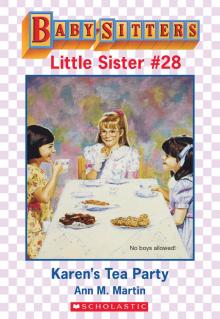 Karen's Tea Party
Karen's Tea Party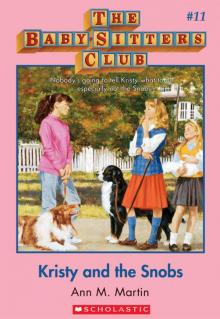 Kristy and the Snobs
Kristy and the Snobs Best Kept Secret
Best Kept Secret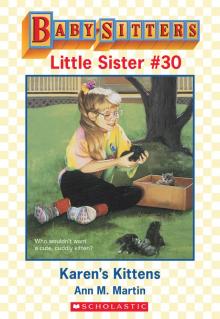 Karen's Kittens
Karen's Kittens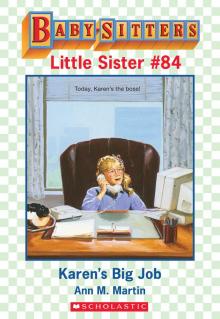 Karen's Big Job
Karen's Big Job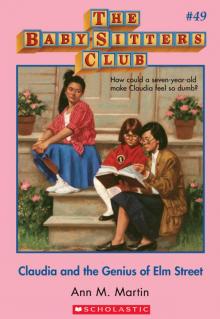 Claudia and the Genius of Elm Street
Claudia and the Genius of Elm Street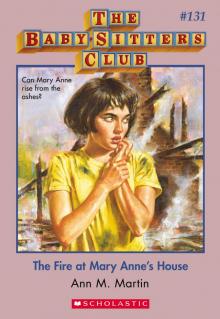 The Fire at Mary Anne's House
The Fire at Mary Anne's House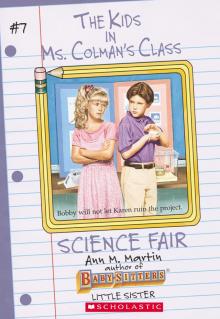 Science Fair
Science Fair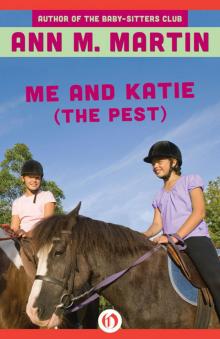 Me and Katie (The Pest)
Me and Katie (The Pest)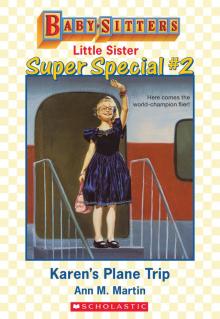 Karen's Plane Trip
Karen's Plane Trip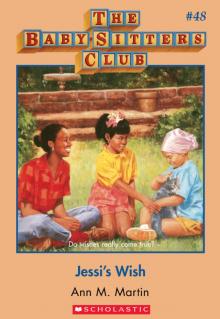 Jessi's Wish
Jessi's Wish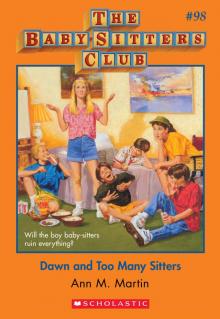 Dawn and Too Many Sitters
Dawn and Too Many Sitters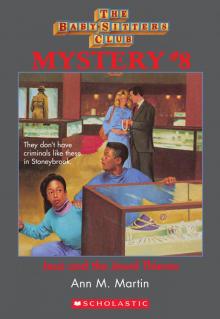 Jessi and the Jewel Thieves
Jessi and the Jewel Thieves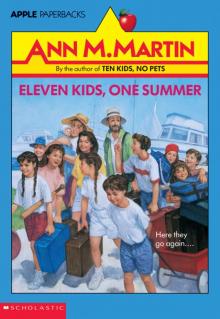 Eleven Kids, One Summer
Eleven Kids, One Summer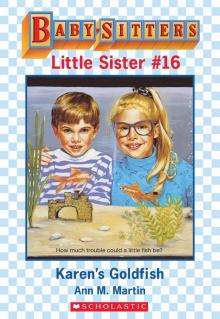 Karen's Goldfish
Karen's Goldfish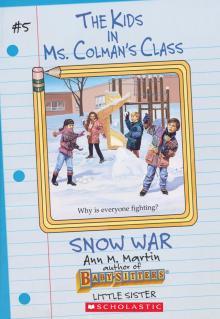 Snow War
Snow War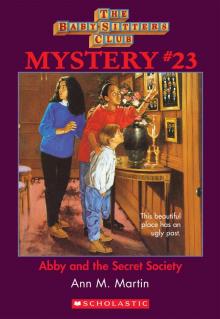 Abby and the Secret Society
Abby and the Secret Society Keeping Secrets
Keeping Secrets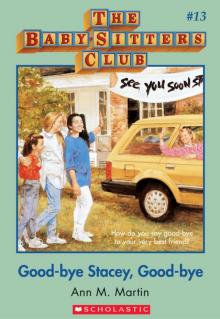 Good-Bye Stacey, Good-Bye
Good-Bye Stacey, Good-Bye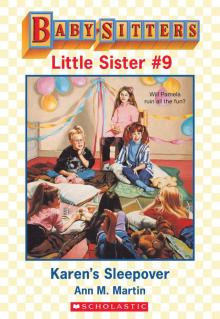 Karen's Sleepover
Karen's Sleepover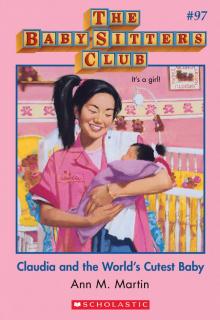 Claudia and the World's Cutest Baby
Claudia and the World's Cutest Baby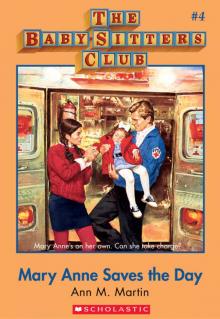 Mary Anne Saves the Day
Mary Anne Saves the Day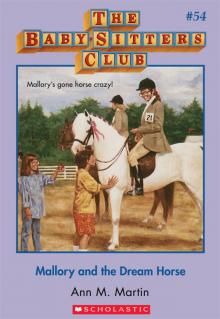 Mallory and the Dream Horse
Mallory and the Dream Horse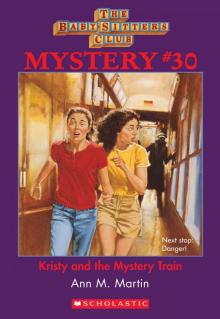 Kristy and the Mystery Train
Kristy and the Mystery Train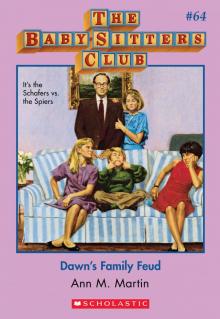 Dawn's Family Feud
Dawn's Family Feud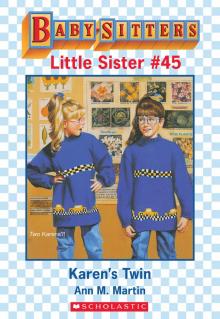 Karen's Twin
Karen's Twin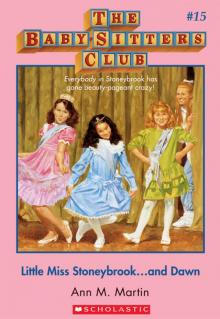 Little Miss Stoneybrook... And Dawn
Little Miss Stoneybrook... And Dawn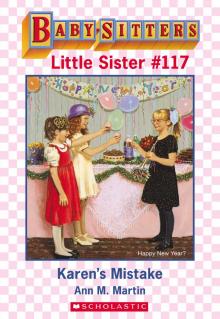 Karen's Mistake
Karen's Mistake Karen's Movie Star
Karen's Movie Star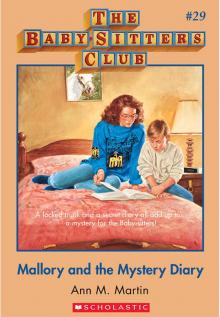 Mallory and the Mystery Diary
Mallory and the Mystery Diary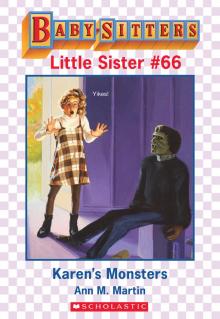 Karen's Monsters
Karen's Monsters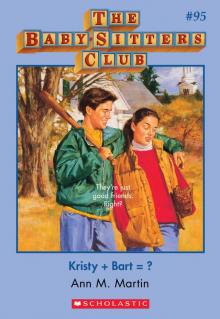 Kristy + Bart = ?
Kristy + Bart = ?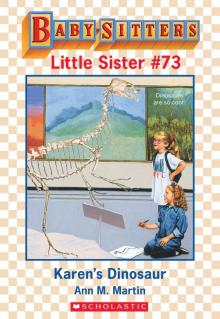 Karen's Dinosaur
Karen's Dinosaur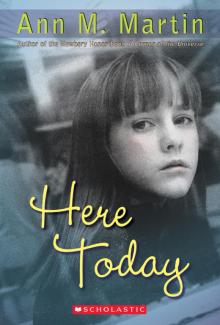 Here Today
Here Today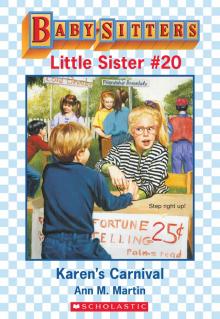 Karen's Carnival
Karen's Carnival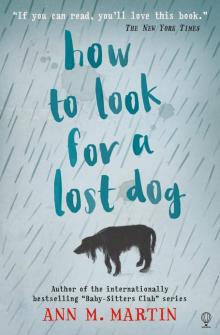 How to Look for a Lost Dog
How to Look for a Lost Dog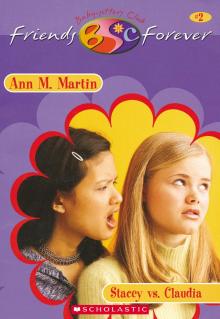 Stacey vs. Claudia
Stacey vs. Claudia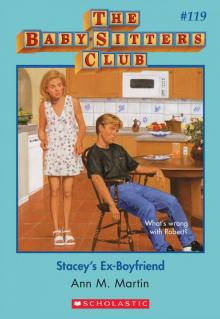 Stacey's Ex-Boyfriend
Stacey's Ex-Boyfriend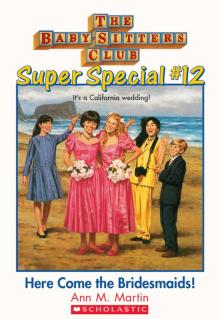 Here Come the Bridesmaids!
Here Come the Bridesmaids! Graduation Day
Graduation Day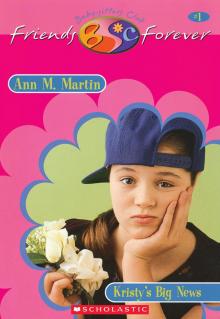 Kristy's Big News
Kristy's Big News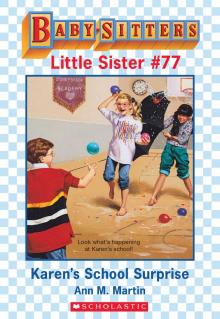 Karen's School Surprise
Karen's School Surprise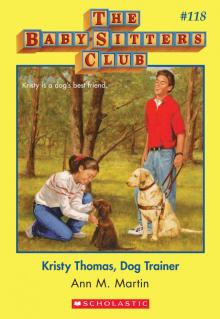 Kristy Thomas, Dog Trainer
Kristy Thomas, Dog Trainer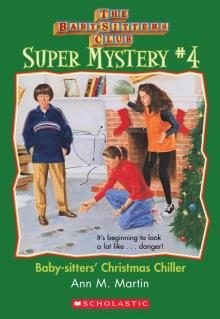 Baby-Sitters' Christmas Chiller
Baby-Sitters' Christmas Chiller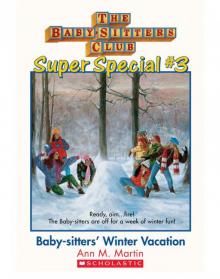 Baby-Sitters' Winter Vacation
Baby-Sitters' Winter Vacation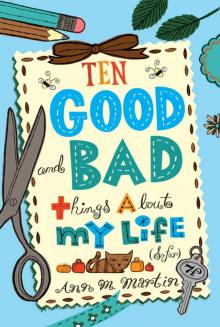 Ten Good and Bad Things About My Life
Ten Good and Bad Things About My Life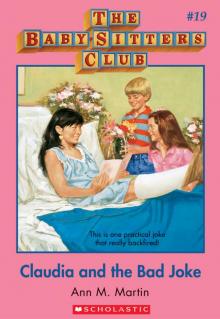 Claudia and the Bad Joke
Claudia and the Bad Joke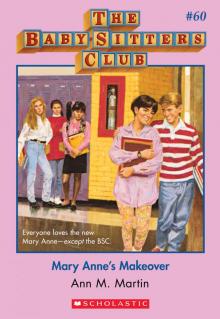 Mary Anne's Makeover
Mary Anne's Makeover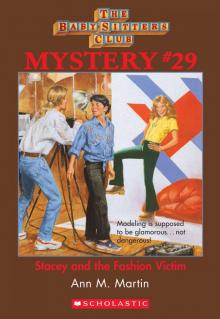 Stacey and the Fashion Victim
Stacey and the Fashion Victim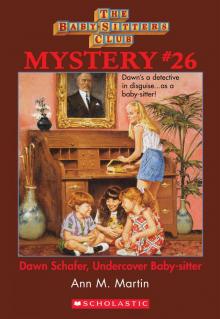 Dawn Schafer, Undercover Baby-Sitter
Dawn Schafer, Undercover Baby-Sitter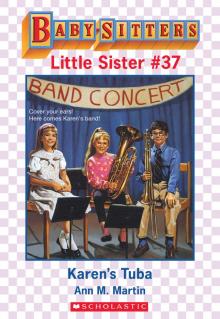 Karen's Tuba
Karen's Tuba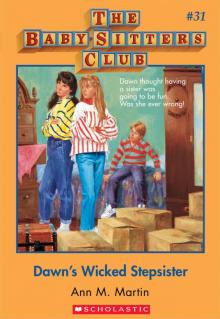 Dawn's Wicked Stepsister
Dawn's Wicked Stepsister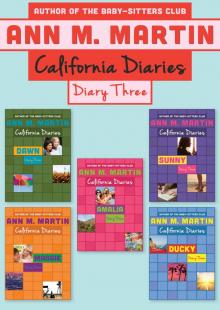 Diary Three: Dawn, Sunny, Maggie, Amalia, and Ducky
Diary Three: Dawn, Sunny, Maggie, Amalia, and Ducky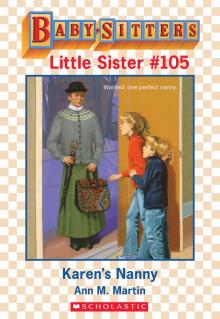 Karen's Nanny
Karen's Nanny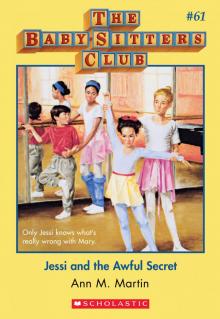 Jessi and the Awful Secret
Jessi and the Awful Secret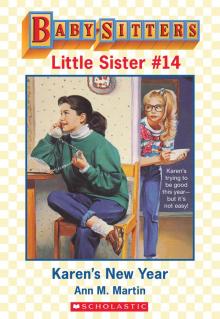 Karen's New Year
Karen's New Year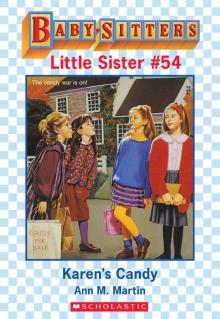 Karen's Candy
Karen's Candy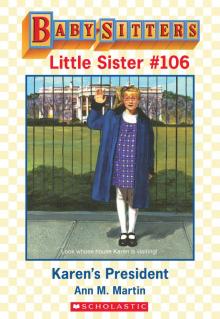 Karen's President
Karen's President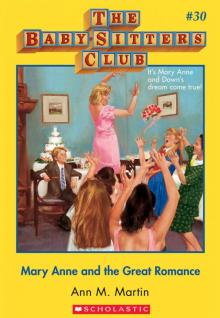 Mary Anne and the Great Romance
Mary Anne and the Great Romance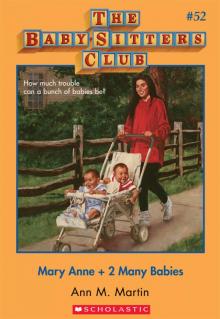 Mary Anne + 2 Many Babies
Mary Anne + 2 Many Babies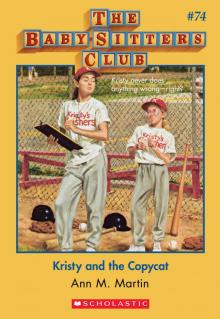 Kristy and the Copycat
Kristy and the Copycat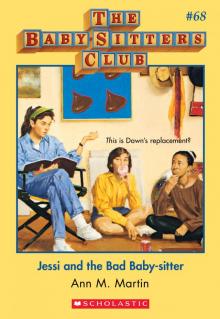 Jessi and the Bad Baby-Sitter
Jessi and the Bad Baby-Sitter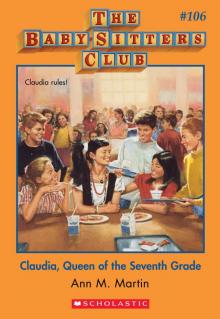 Claudia, Queen of the Seventh Grade
Claudia, Queen of the Seventh Grade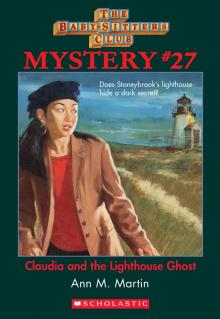 Claudia and the Lighthouse Ghost
Claudia and the Lighthouse Ghost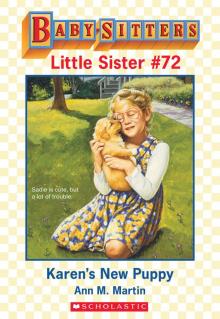 Karen's New Puppy
Karen's New Puppy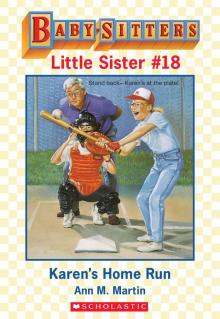 Karen's Home Run
Karen's Home Run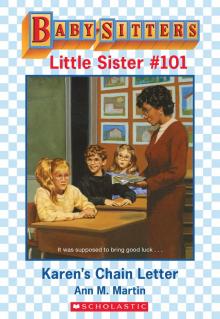 Karen's Chain Letter
Karen's Chain Letter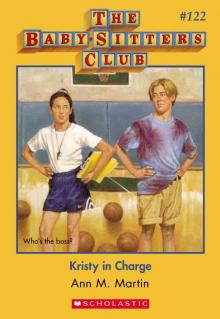 Kristy in Charge
Kristy in Charge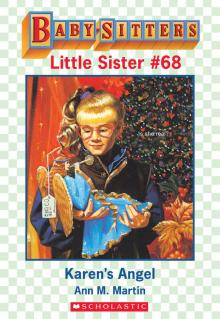 Karen's Angel
Karen's Angel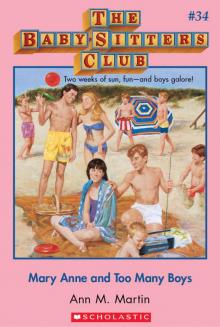 Mary Anne and Too Many Boys
Mary Anne and Too Many Boys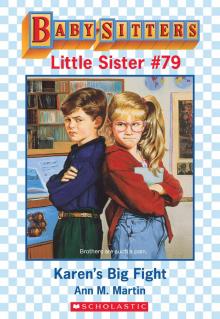 Karen's Big Fight
Karen's Big Fight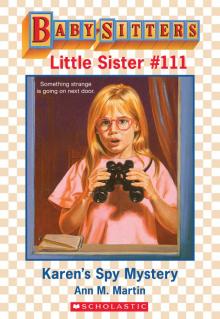 Karen's Spy Mystery
Karen's Spy Mystery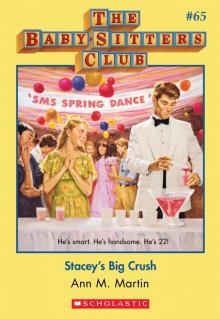 Stacey's Big Crush
Stacey's Big Crush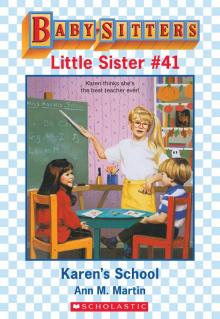 Karen's School
Karen's School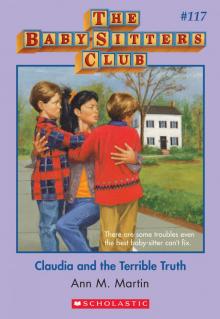 Claudia and the Terrible Truth
Claudia and the Terrible Truth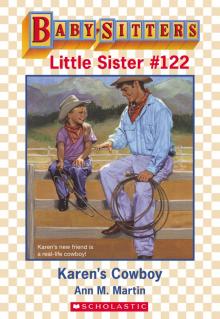 Karen's Cowboy
Karen's Cowboy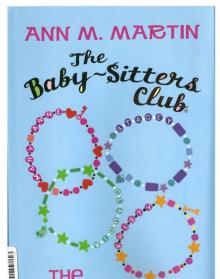 The Summer Before
The Summer Before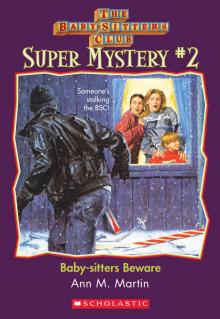 Beware, Dawn!
Beware, Dawn!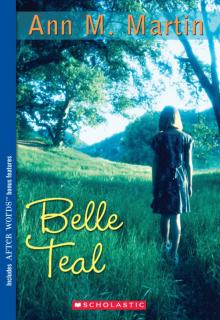 Belle Teale
Belle Teale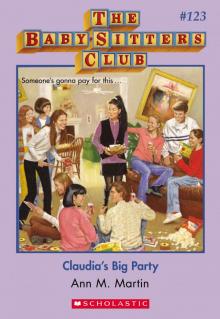 Claudia's Big Party
Claudia's Big Party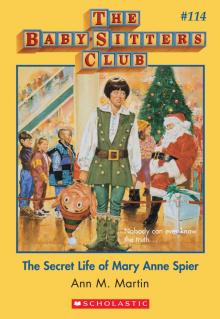 The Secret Life of Mary Anne Spier
The Secret Life of Mary Anne Spier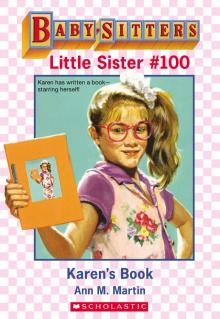 Karen's Book
Karen's Book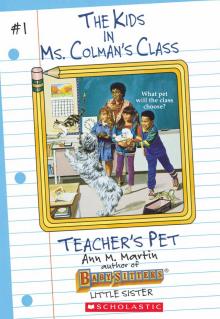 Teacher's Pet
Teacher's Pet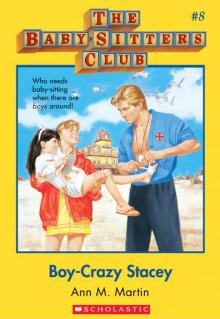 Boy-Crazy Stacey
Boy-Crazy Stacey Claudia and the Disaster Date
Claudia and the Disaster Date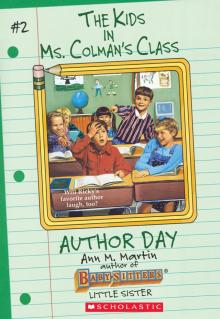 Author Day
Author Day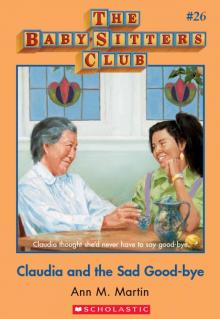 Claudia and the Sad Good-Bye
Claudia and the Sad Good-Bye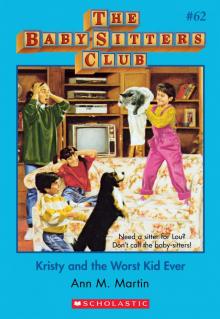 Kristy and the Worst Kid Ever
Kristy and the Worst Kid Ever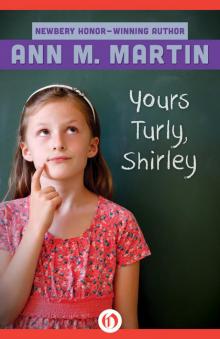 Yours Turly, Shirley
Yours Turly, Shirley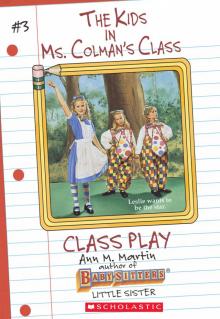 Class Play
Class Play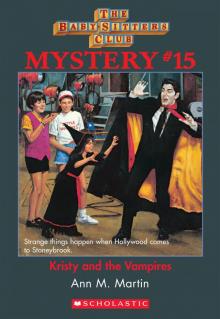 Kristy and the Vampires
Kristy and the Vampires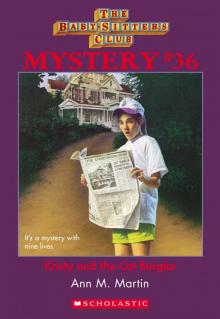 Kristy and the Cat Burglar
Kristy and the Cat Burglar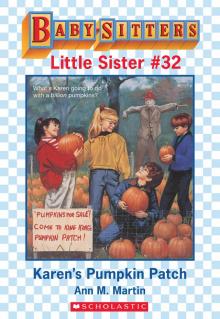 Karen's Pumpkin Patch
Karen's Pumpkin Patch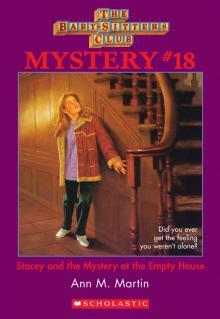 Stacey and the Mystery at the Empty House
Stacey and the Mystery at the Empty House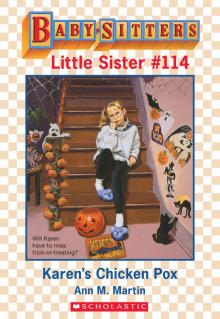 Karen's Chicken Pox
Karen's Chicken Pox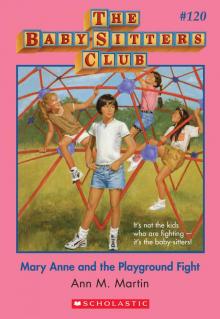 Mary Anne and the Playground Fight
Mary Anne and the Playground Fight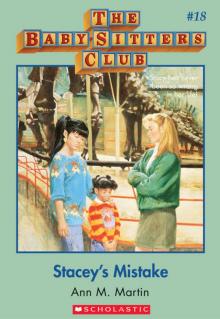 Stacey's Mistake
Stacey's Mistake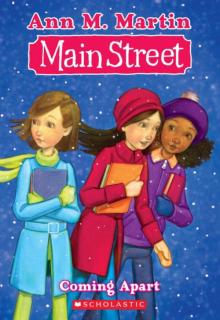 Coming Apart
Coming Apart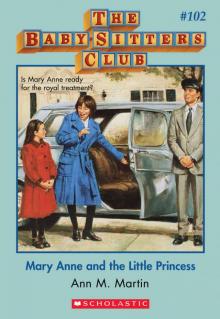 Mary Anne and the Little Princess
Mary Anne and the Little Princess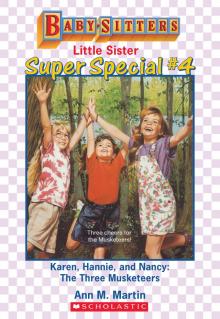 Karen, Hannie and Nancy: The Three Musketeers
Karen, Hannie and Nancy: The Three Musketeers 'Tis the Season
'Tis the Season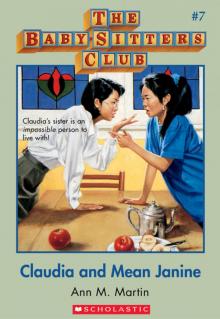 Claudia and Mean Janine
Claudia and Mean Janine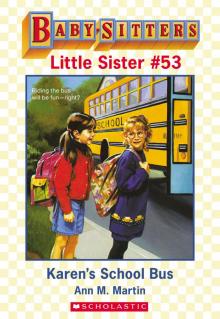 Karen's School Bus
Karen's School Bus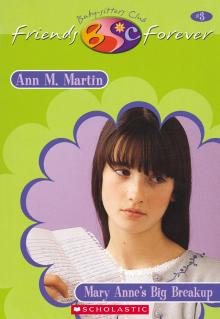 Mary Anne's Big Breakup
Mary Anne's Big Breakup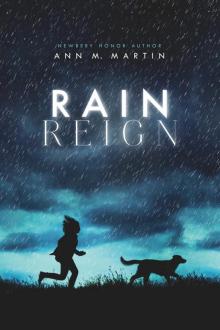 Rain Reign
Rain Reign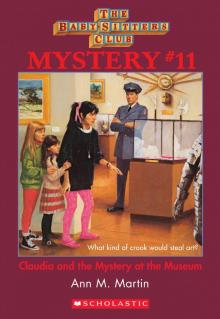 Claudia and the Mystery at the Museum
Claudia and the Mystery at the Museum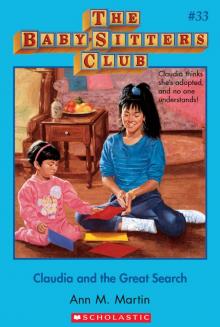 Claudia and the Great Search
Claudia and the Great Search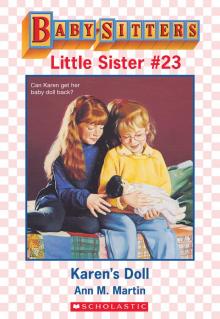 Karen's Doll
Karen's Doll Shannon's Story
Shannon's Story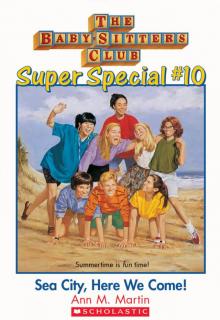 Sea City, Here We Come!
Sea City, Here We Come!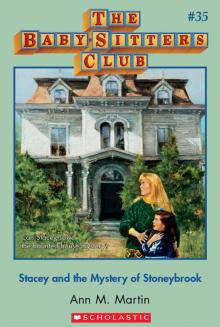 Stacey and the Mystery of Stoneybrook
Stacey and the Mystery of Stoneybrook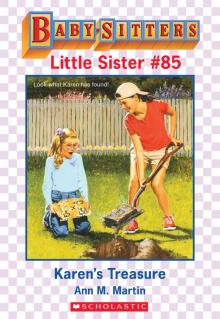 Karen's Treasure
Karen's Treasure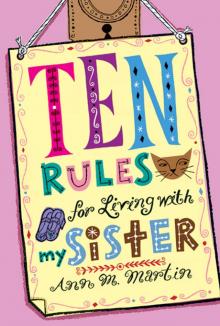 Ten Rules for Living With My Sister
Ten Rules for Living With My Sister With You and Without You
With You and Without You Baby-Sitters' Island Adventure
Baby-Sitters' Island Adventure Karen's Fishing Trip
Karen's Fishing Trip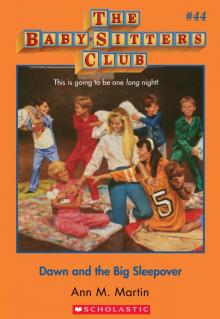 Dawn and the Big Sleepover
Dawn and the Big Sleepover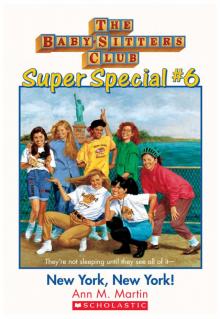 New York, New York!
New York, New York!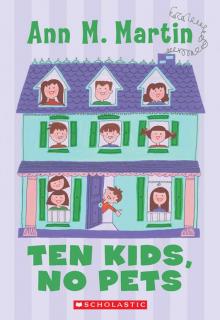 Ten Kids, No Pets
Ten Kids, No Pets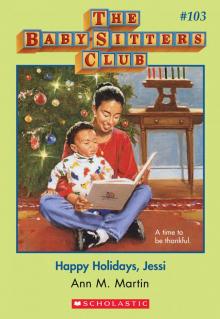 Happy Holidays, Jessi
Happy Holidays, Jessi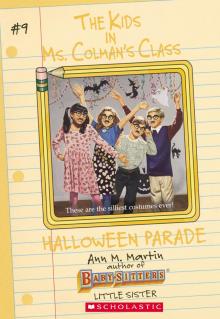 Halloween Parade
Halloween Parade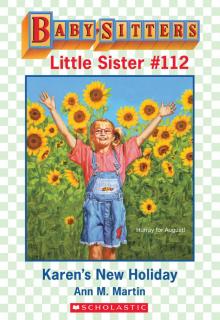 Karen's New Holiday
Karen's New Holiday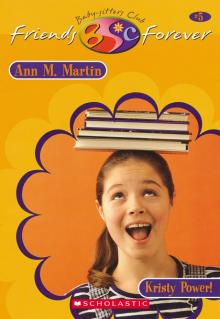 Kristy Power!
Kristy Power!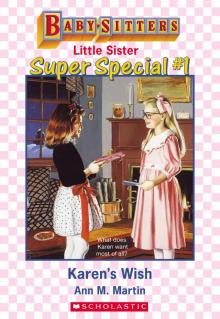 Karen's Wish
Karen's Wish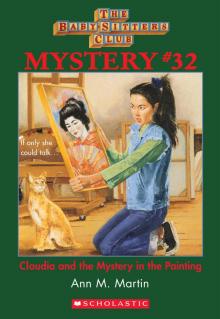 Claudia and the Mystery in the Painting
Claudia and the Mystery in the Painting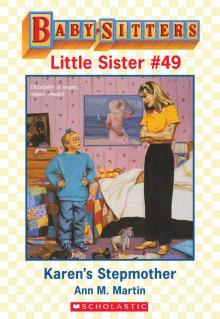 Karen's Stepmother
Karen's Stepmother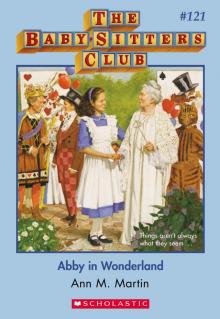 Abby in Wonderland
Abby in Wonderland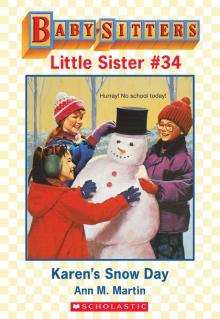 Karen's Snow Day
Karen's Snow Day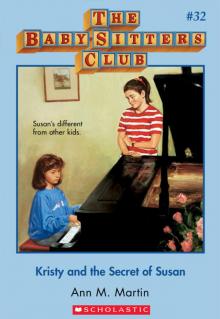 Kristy and the Secret of Susan
Kristy and the Secret of Susan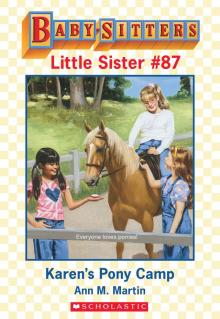 Karen's Pony Camp
Karen's Pony Camp Karen's School Trip
Karen's School Trip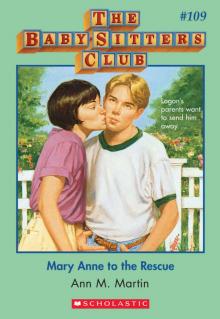 Mary Anne to the Rescue
Mary Anne to the Rescue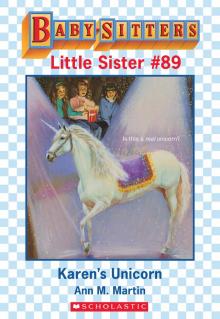 Karen's Unicorn
Karen's Unicorn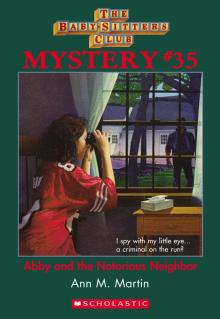 Abby and the Notorious Neighbor
Abby and the Notorious Neighbor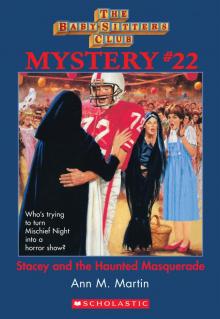 Stacey and the Haunted Masquerade
Stacey and the Haunted Masquerade Claudia Gets Her Guy
Claudia Gets Her Guy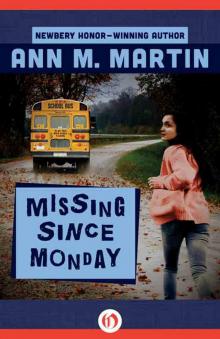 Missing Since Monday
Missing Since Monday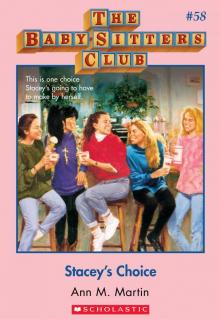 Stacey's Choice
Stacey's Choice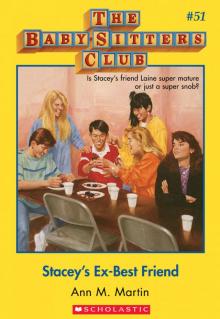 Stacey's Ex-Best Friend
Stacey's Ex-Best Friend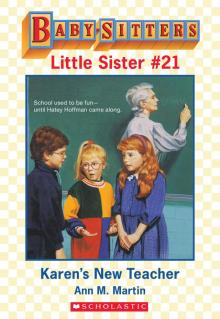 Karen's New Teacher
Karen's New Teacher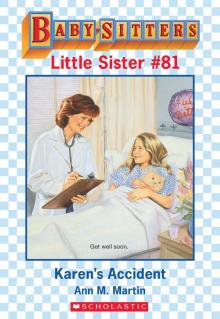 Karen's Accident
Karen's Accident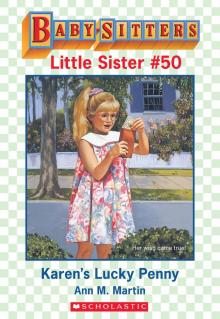 Karen's Lucky Penny
Karen's Lucky Penny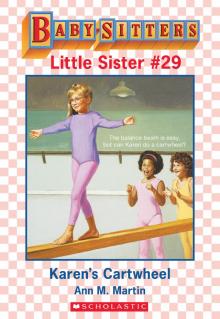 Karen's Cartwheel
Karen's Cartwheel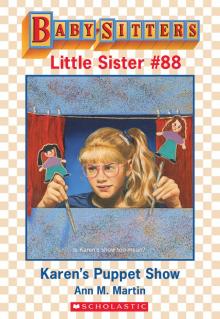 Karen's Puppet Show
Karen's Puppet Show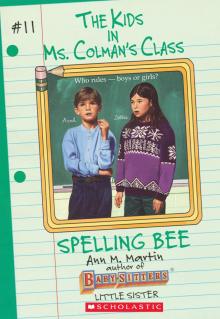 Spelling Bee
Spelling Bee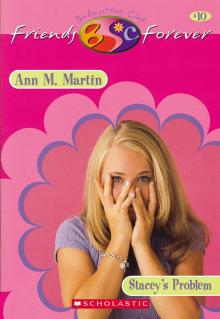 Stacey's Problem
Stacey's Problem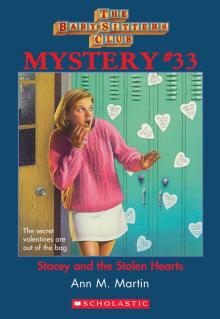 Stacey and the Stolen Hearts
Stacey and the Stolen Hearts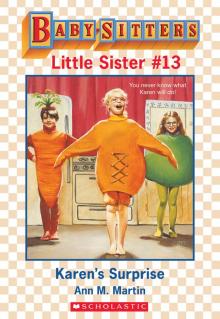 Karen's Surprise
Karen's Surprise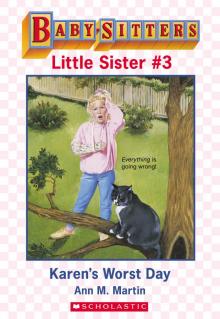 Karen's Worst Day
Karen's Worst Day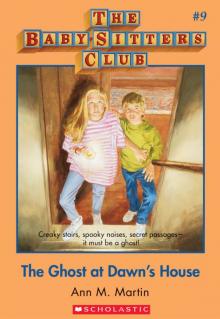 The Ghost at Dawn's House
The Ghost at Dawn's House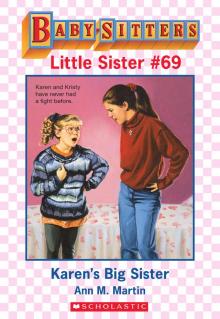 Karen's Big Sister
Karen's Big Sister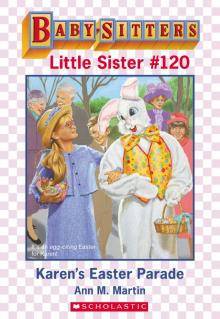 Karen's Easter Parade
Karen's Easter Parade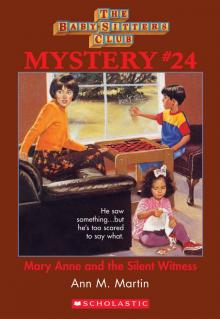 Mary Anne and the Silent Witness
Mary Anne and the Silent Witness Karen's Swim Meet
Karen's Swim Meet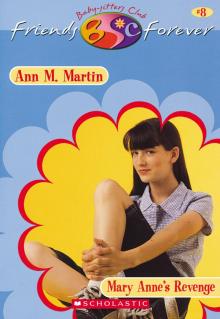 Mary Anne's Revenge
Mary Anne's Revenge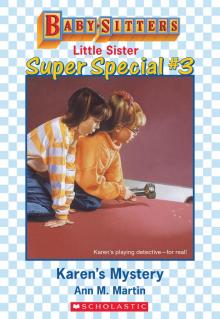 Karen's Mystery
Karen's Mystery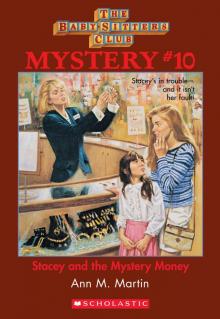 Stacey and the Mystery Money
Stacey and the Mystery Money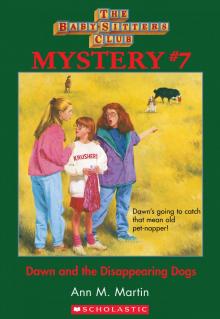 Dawn and the Disappearing Dogs
Dawn and the Disappearing Dogs Karen's Christmas Tree
Karen's Christmas Tree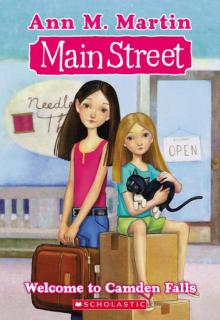 Welcome to Camden Falls
Welcome to Camden Falls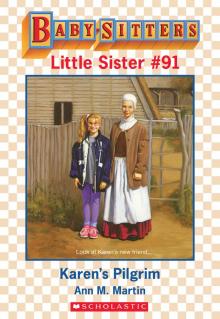 Karen's Pilgrim
Karen's Pilgrim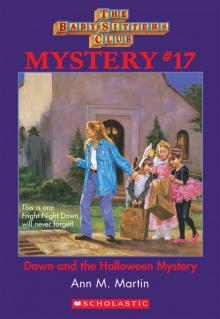 Dawn and the Halloween Mystery
Dawn and the Halloween Mystery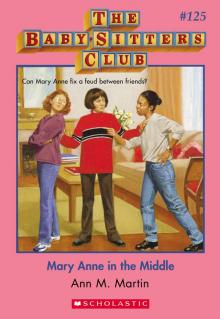 Mary Anne in the Middle
Mary Anne in the Middle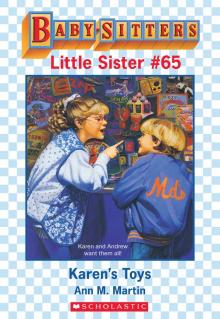 Karen's Toys
Karen's Toys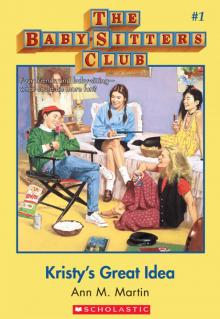 Kristy's Great Idea
Kristy's Great Idea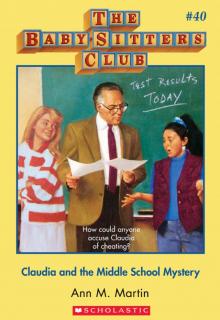 Claudia and the Middle School Mystery
Claudia and the Middle School Mystery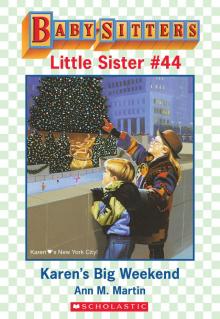 Karen's Big Weekend
Karen's Big Weekend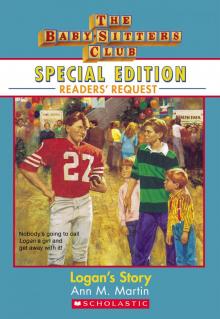 Logan's Story
Logan's Story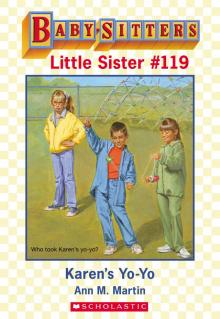 Karen's Yo-Yo
Karen's Yo-Yo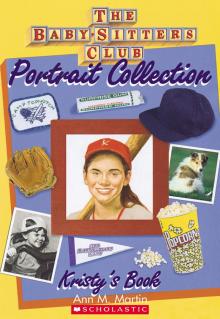 Kristy's Book
Kristy's Book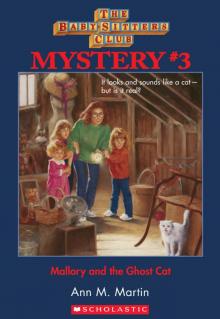 Mallory and the Ghost Cat
Mallory and the Ghost Cat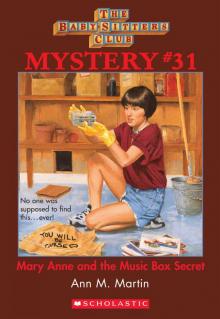 Mary Anne and the Music
Mary Anne and the Music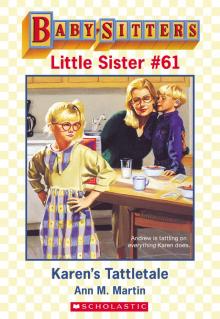 Karen's Tattletale
Karen's Tattletale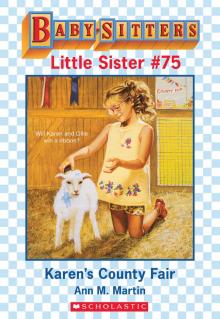 Karen's County Fair
Karen's County Fair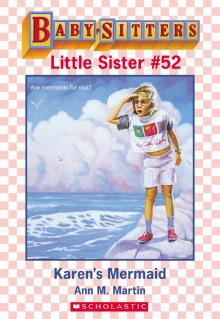 Karen's Mermaid
Karen's Mermaid Snowbound
Snowbound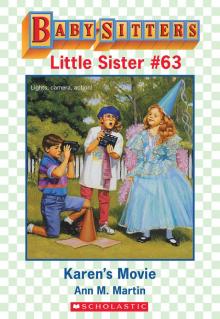 Karen's Movie
Karen's Movie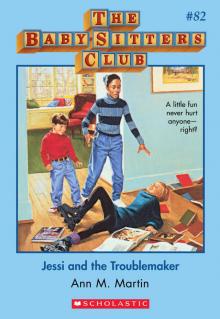 Jessi and the Troublemaker
Jessi and the Troublemaker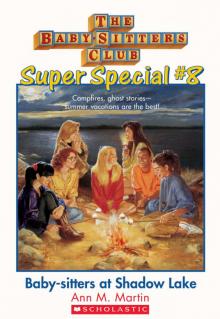 Baby-Sitters at Shadow Lake
Baby-Sitters at Shadow Lake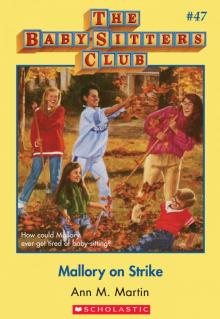 Mallory on Strike
Mallory on Strike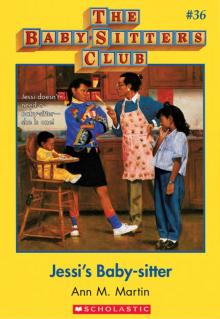 Jessi's Baby-Sitter
Jessi's Baby-Sitter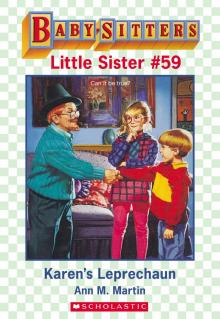 Karen's Leprechaun
Karen's Leprechaun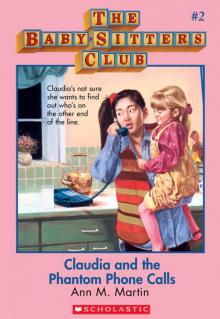 Claudia and the Phantom Phone Calls
Claudia and the Phantom Phone Calls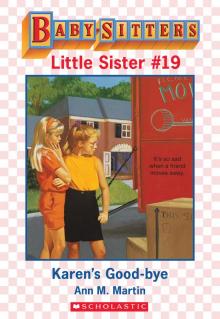 Karen's Good-Bye
Karen's Good-Bye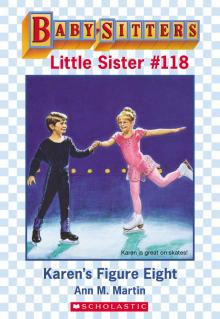 Karen's Figure Eight
Karen's Figure Eight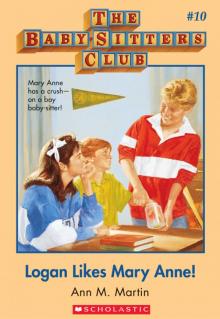 Logan Likes Mary Anne!
Logan Likes Mary Anne!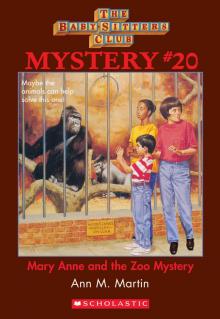 Mary Anne and the Zoo Mystery
Mary Anne and the Zoo Mystery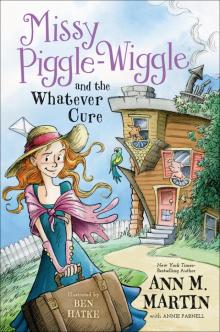 Missy Piggle-Wiggle and the Whatever Cure
Missy Piggle-Wiggle and the Whatever Cure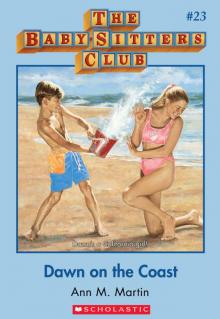 Dawn on the Coast
Dawn on the Coast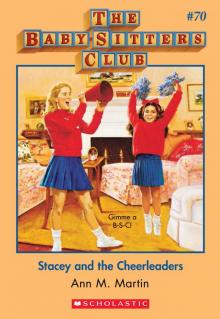 Stacey and the Cheerleaders
Stacey and the Cheerleaders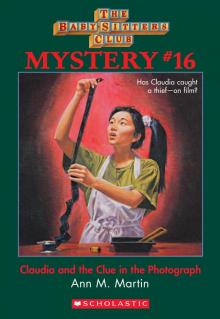 Claudia and the Clue in the Photograph
Claudia and the Clue in the Photograph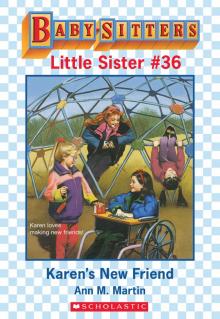 Karen's New Friend
Karen's New Friend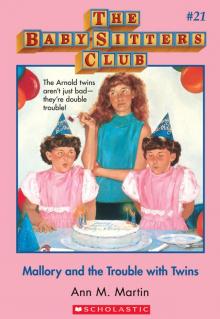 Mallory and the Trouble With Twins
Mallory and the Trouble With Twins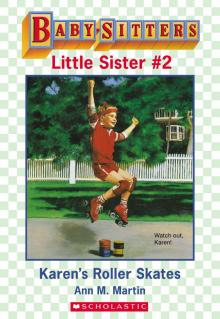 Karen's Roller Skates
Karen's Roller Skates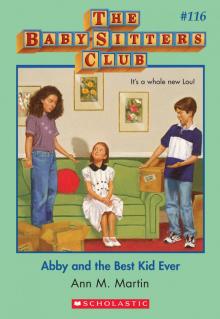 Abby and the Best Kid Ever
Abby and the Best Kid Ever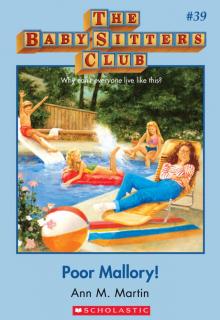 Poor Mallory!
Poor Mallory!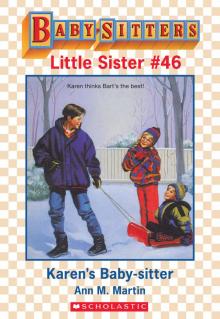 Karen's Witch
Karen's Witch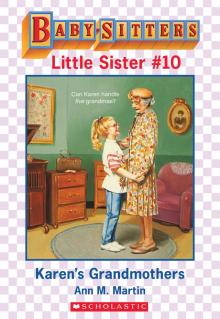 Karen's Grandmothers
Karen's Grandmothers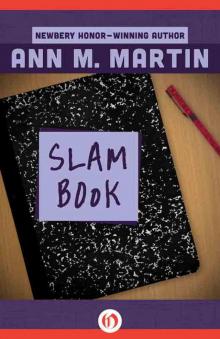 Slam Book
Slam Book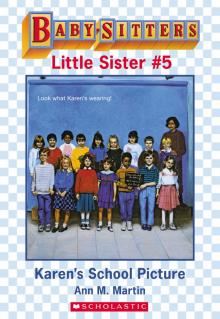 Karen's School Picture
Karen's School Picture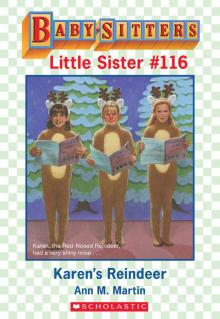 Karen's Reindeer
Karen's Reindeer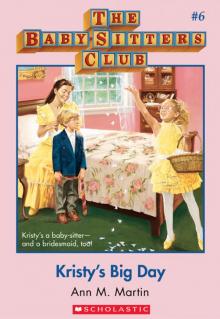 Kristy's Big Day
Kristy's Big Day The Long Way Home
The Long Way Home Karen's Sleigh Ride
Karen's Sleigh Ride On Christmas Eve
On Christmas Eve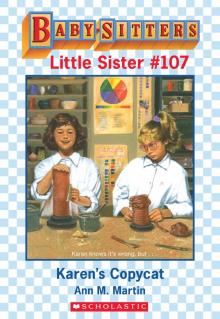 Karen's Copycat
Karen's Copycat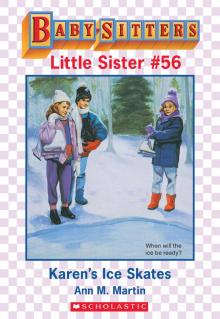 Karen's Ice Skates
Karen's Ice Skates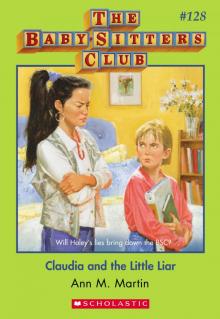 Claudia and the Little Liar
Claudia and the Little Liar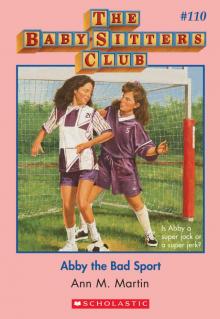 Abby the Bad Sport
Abby the Bad Sport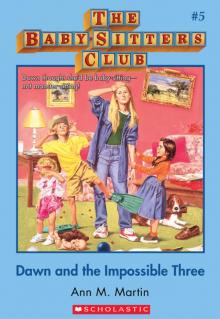 The Baby-Sitters Club #5: Dawn and the Impossible Three
The Baby-Sitters Club #5: Dawn and the Impossible Three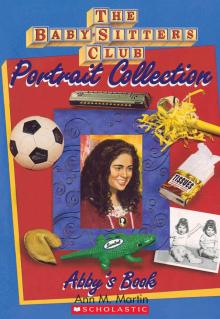 Abby's Book
Abby's Book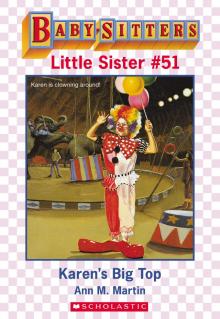 Karen's Big Top
Karen's Big Top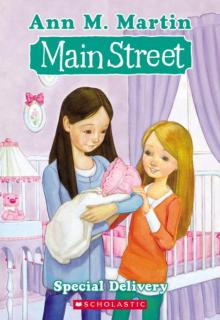 Main Street #8: Special Delivery
Main Street #8: Special Delivery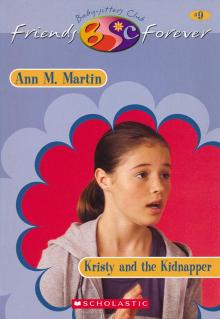 Kristy and the Kidnapper
Kristy and the Kidnapper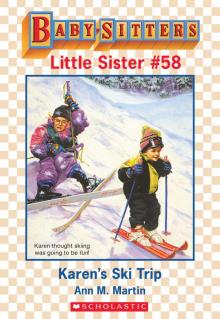 Karen's Ski Trip
Karen's Ski Trip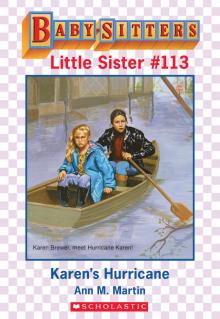 Karen's Hurricane
Karen's Hurricane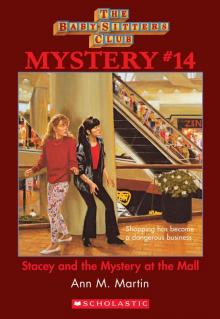 Stacey and the Mystery at the Mall
Stacey and the Mystery at the Mall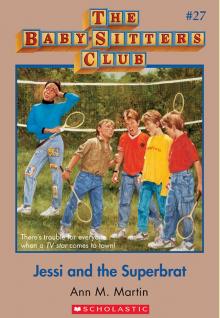 Jessi and the Superbrat
Jessi and the Superbrat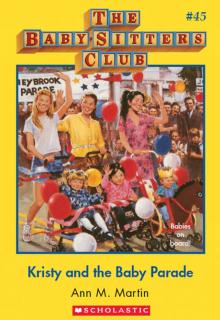 Kristy and the Baby Parade
Kristy and the Baby Parade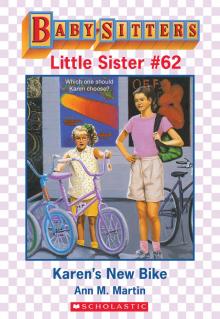 Karen's New Bike
Karen's New Bike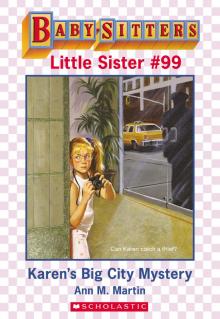 Karen's Big City Mystery
Karen's Big City Mystery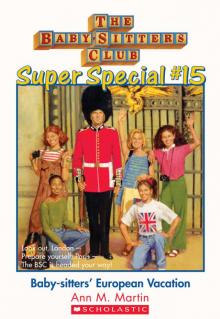 Baby-Sitters' European Vacation
Baby-Sitters' European Vacation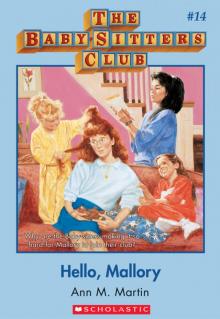 Hello, Mallory
Hello, Mallory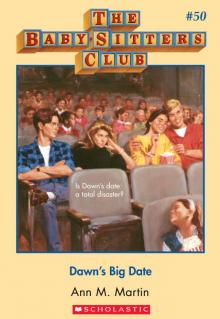 Dawn's Big Date
Dawn's Big Date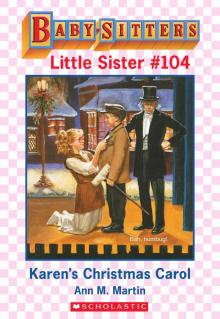 Karen's Christmas Carol
Karen's Christmas Carol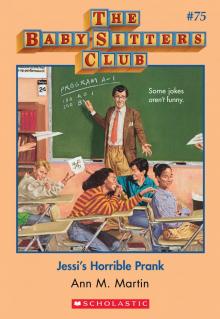 Jessi's Horrible Prank
Jessi's Horrible Prank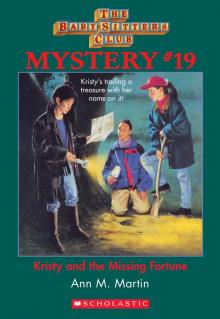 Kristy and the Missing Fortune
Kristy and the Missing Fortune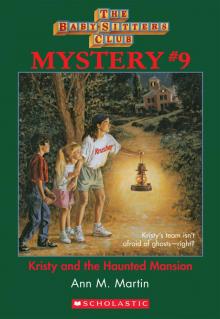 Kristy and the Haunted Mansion
Kristy and the Haunted Mansion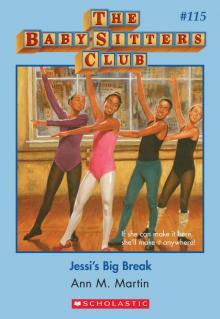 Jessi's Big Break
Jessi's Big Break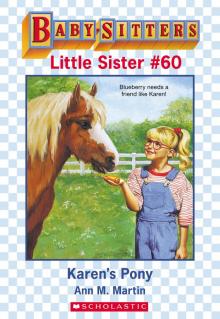 Karen's Pony
Karen's Pony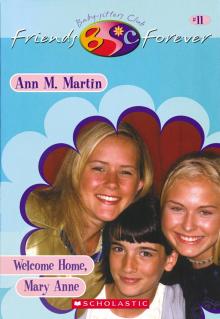 Welcome Home, Mary Anne
Welcome Home, Mary Anne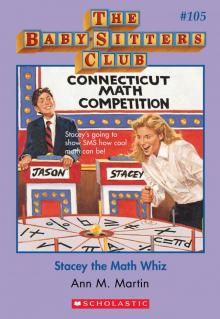 Stacey the Math Whiz
Stacey the Math Whiz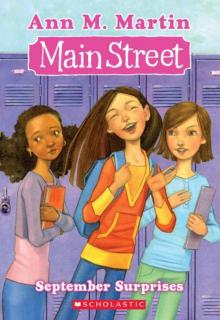 September Surprises
September Surprises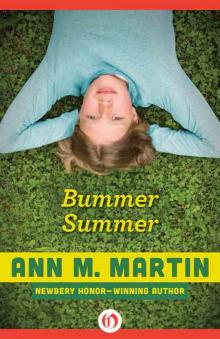 Bummer Summer
Bummer Summer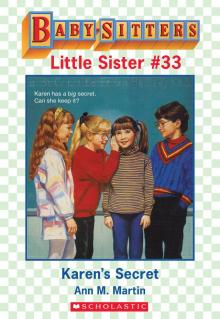 Karen's Secret
Karen's Secret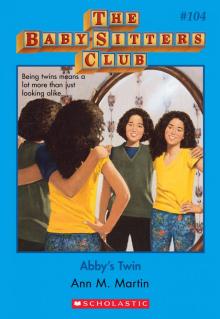 Abby's Twin
Abby's Twin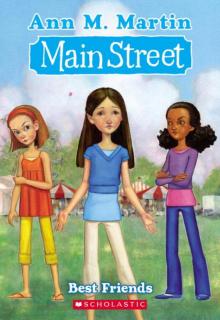 Main Street #4: Best Friends
Main Street #4: Best Friends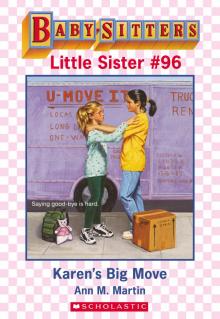 Karen's Big Move
Karen's Big Move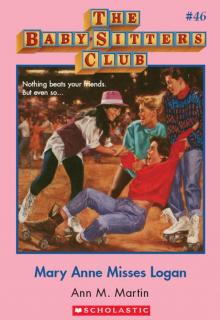 Mary Anne Misses Logan
Mary Anne Misses Logan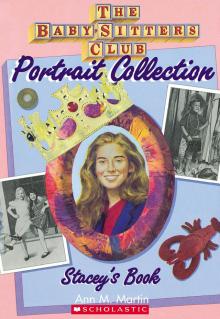 Stacey's Book
Stacey's Book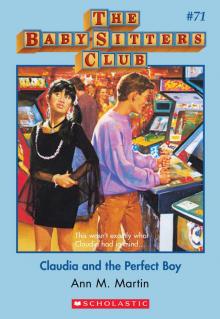 Claudia and the Perfect Boy
Claudia and the Perfect Boy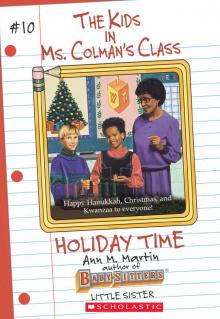 Holiday Time
Holiday Time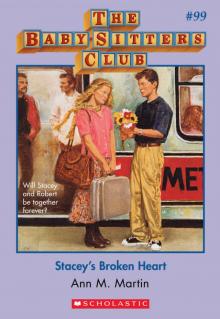 Stacey's Broken Heart
Stacey's Broken Heart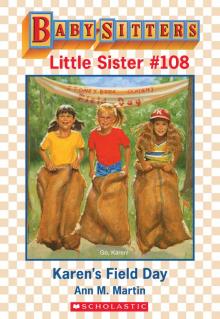 Karen's Field Day
Karen's Field Day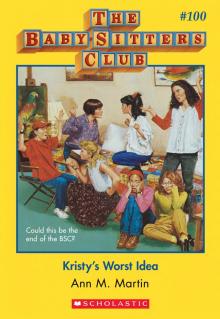 Kristy's Worst Idea
Kristy's Worst Idea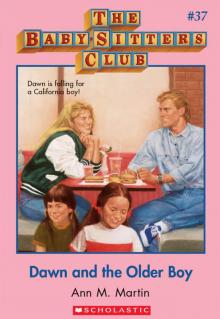 Dawn and the Older Boy
Dawn and the Older Boy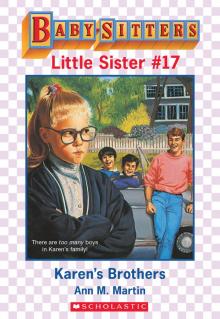 Karen's Brothers
Karen's Brothers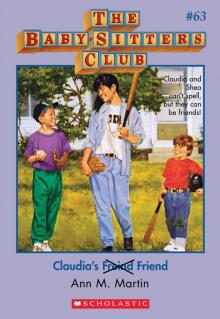 Claudia's Friend
Claudia's Friend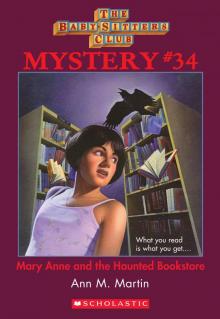 Mary Anne and the Haunted Bookstore
Mary Anne and the Haunted Bookstore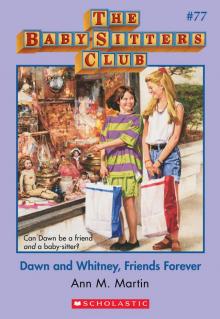 Dawn and Whitney, Friends Forever
Dawn and Whitney, Friends Forever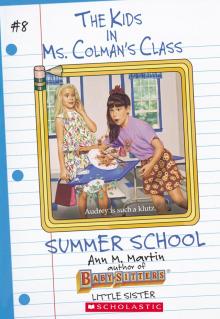 Summer School
Summer School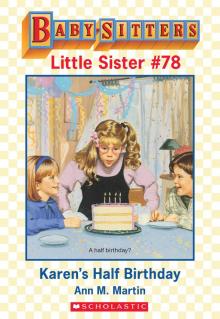 Karen's Birthday
Karen's Birthday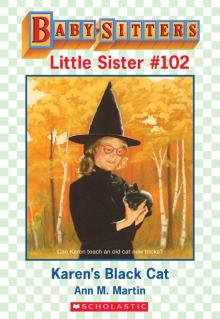 Karen's Black Cat
Karen's Black Cat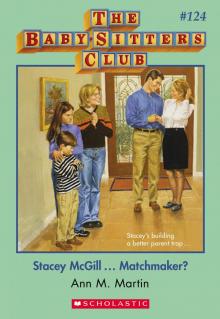 Stacey McGill... Matchmaker?
Stacey McGill... Matchmaker?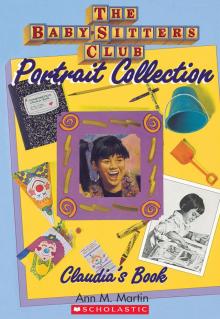 Claudia's Book
Claudia's Book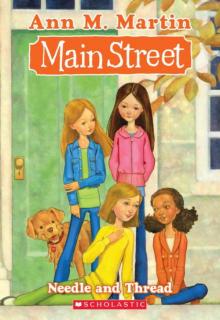 Main Street #2: Needle and Thread
Main Street #2: Needle and Thread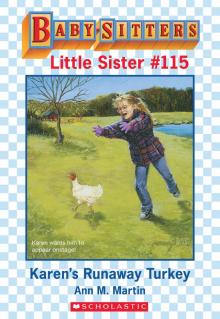 Karen's Runaway Turkey
Karen's Runaway Turkey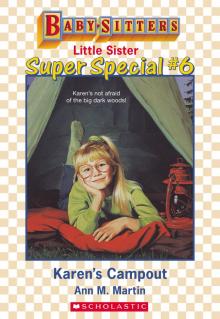 Karen's Campout
Karen's Campout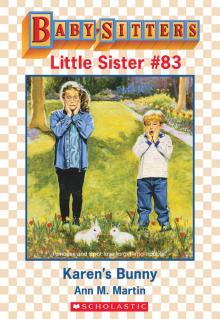 Karen's Bunny
Karen's Bunny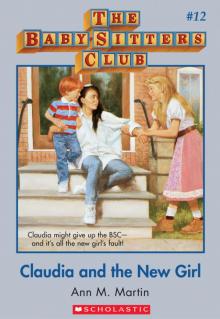 Claudia and the New Girl
Claudia and the New Girl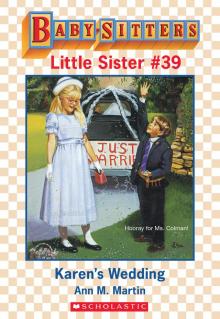 Karen's Wedding
Karen's Wedding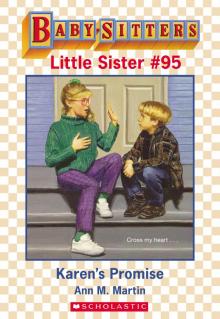 Karen's Promise
Karen's Promise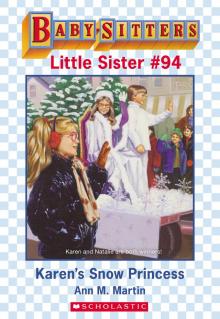 Karen's Snow Princess
Karen's Snow Princess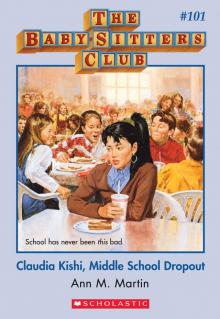 Claudia Kishi, Middle School Dropout
Claudia Kishi, Middle School Dropout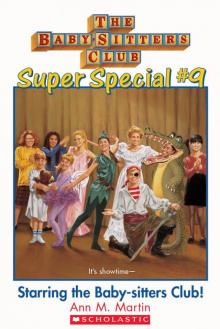 Starring the Baby-Sitters Club!
Starring the Baby-Sitters Club!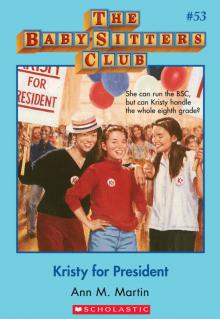 Kristy for President
Kristy for President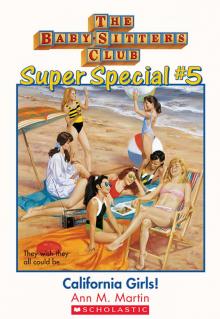 California Girls!
California Girls!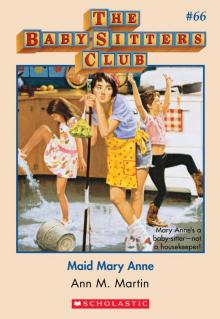 Maid Mary Anne
Maid Mary Anne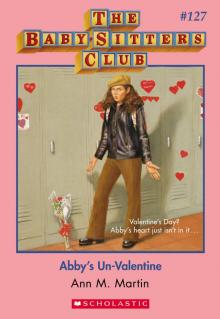 Abby's Un-Valentine
Abby's Un-Valentine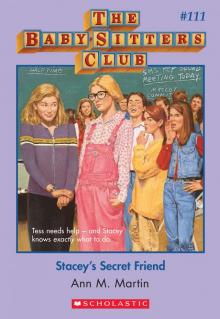 Stacey's Secret Friend
Stacey's Secret Friend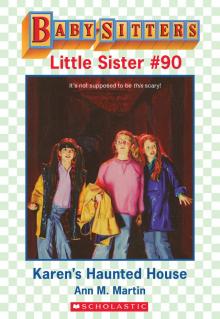 Karen's Haunted House
Karen's Haunted House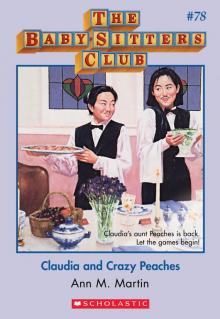 Claudia and Crazy Peaches
Claudia and Crazy Peaches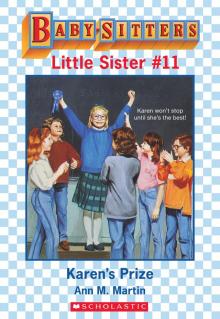 Karen's Prize
Karen's Prize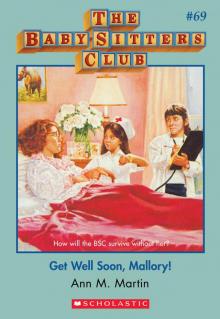 Get Well Soon, Mallory!
Get Well Soon, Mallory!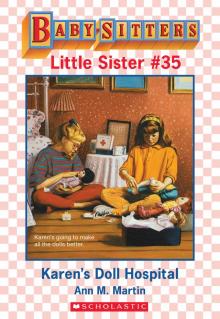 Karen's Doll Hospital
Karen's Doll Hospital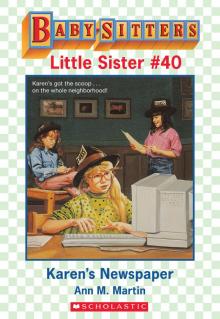 Karen's Newspaper
Karen's Newspaper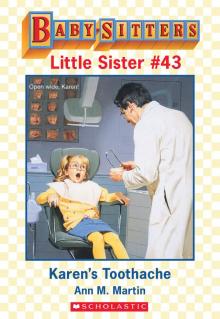 Karen's Toothache
Karen's Toothache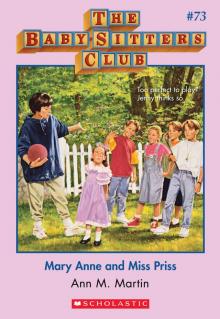 Mary Anne and Miss Priss
Mary Anne and Miss Priss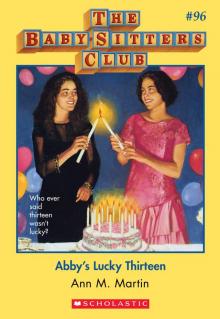 Abby's Lucky Thirteen
Abby's Lucky Thirteen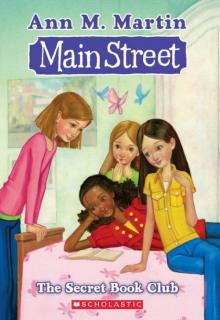 The Secret Book Club
The Secret Book Club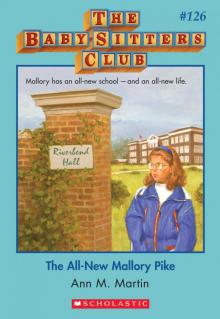 The All-New Mallory Pike
The All-New Mallory Pike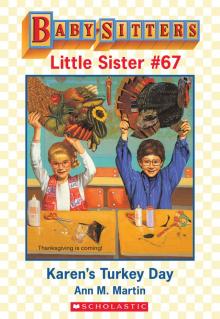 Karen's Turkey Day
Karen's Turkey Day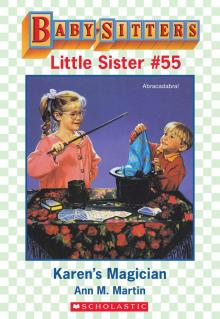 Karen's Magician
Karen's Magician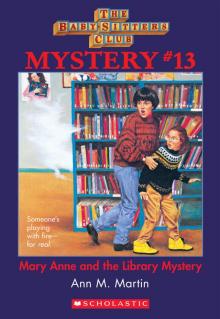 Mary Anne and the Library Mystery
Mary Anne and the Library Mystery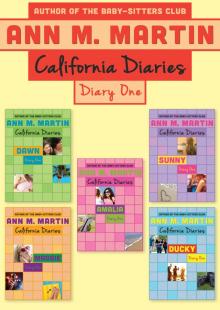 Diary One: Dawn, Sunny, Maggie, Amalia, and Ducky
Diary One: Dawn, Sunny, Maggie, Amalia, and Ducky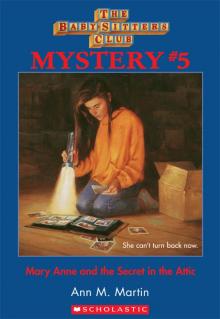 Mary Anne and the Secret in the Attic
Mary Anne and the Secret in the Attic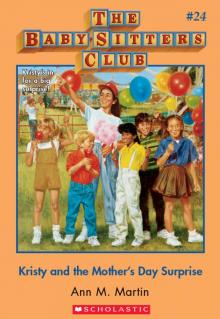 Kristy and the Mother's Day Surprise
Kristy and the Mother's Day Surprise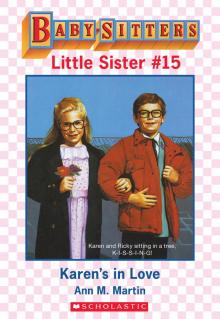 Karen's in Love
Karen's in Love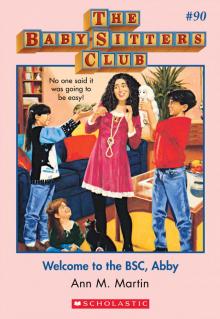 Welcome to the BSC, Abby
Welcome to the BSC, Abby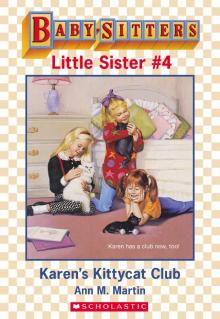 Karen's Kittycat Club
Karen's Kittycat Club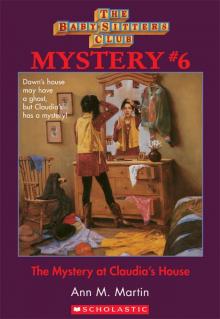 The Mystery at Claudia's House
The Mystery at Claudia's House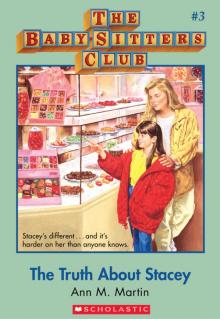 The Truth About Stacey
The Truth About Stacey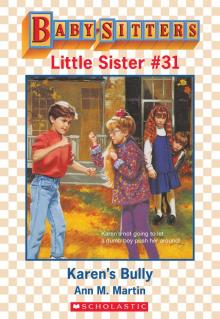 Karen's Bully
Karen's Bully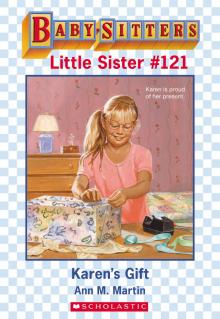 Karen's Gift
Karen's Gift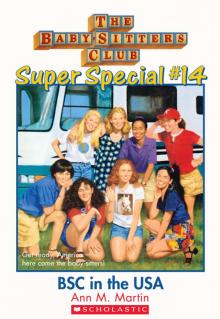 BSC in the USA
BSC in the USA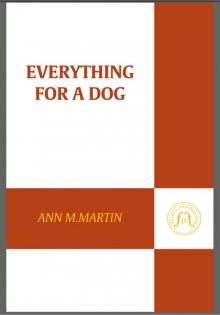 Everything for a Dog
Everything for a Dog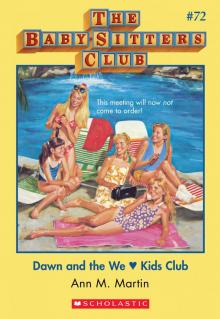 Dawn and the We Love Kids Club
Dawn and the We Love Kids Club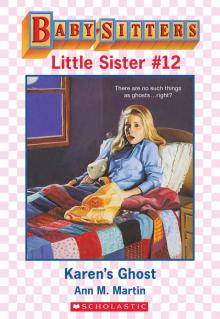 Karen's Ghost
Karen's Ghost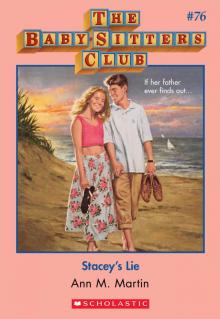 Stacey's Lie
Stacey's Lie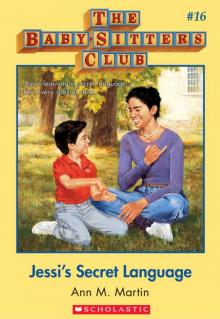 Jessi's Secret Language
Jessi's Secret Language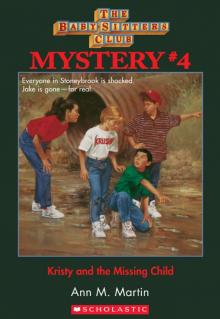 Kristy and the Missing Child
Kristy and the Missing Child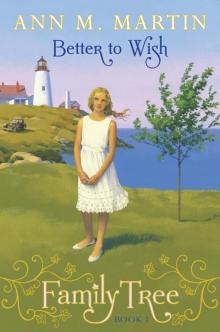 Better to Wish
Better to Wish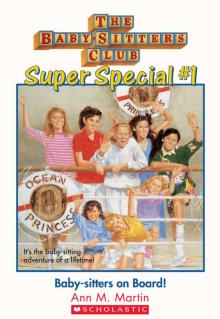 Baby-Sitters on Board!
Baby-Sitters on Board!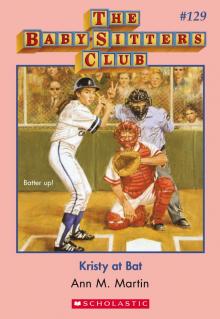 Kristy at Bat
Kristy at Bat Everything Changes
Everything Changes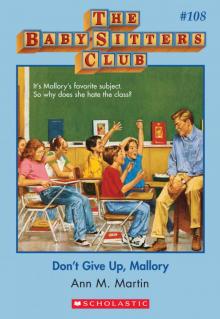 Don't Give Up, Mallory
Don't Give Up, Mallory A Dog's Life: The Autobiography of a Stray
A Dog's Life: The Autobiography of a Stray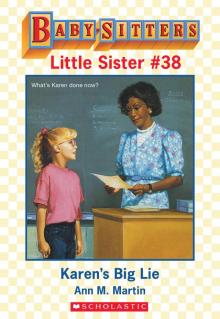 Karen's Big Lie
Karen's Big Lie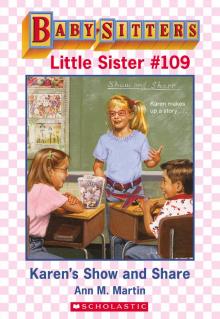 Karen's Show and Share
Karen's Show and Share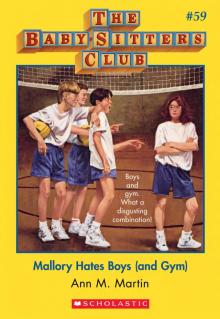 Mallory Hates Boys (and Gym)
Mallory Hates Boys (and Gym)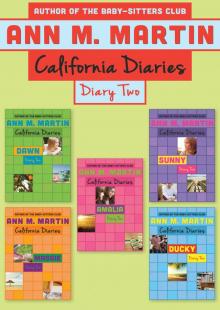 Diary Two: Dawn, Sunny, Maggie, Amalia, and Ducky
Diary Two: Dawn, Sunny, Maggie, Amalia, and Ducky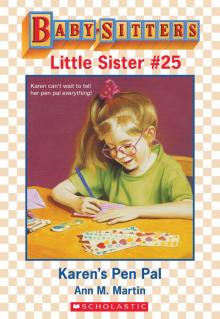 Karen's Pen Pal
Karen's Pen Pal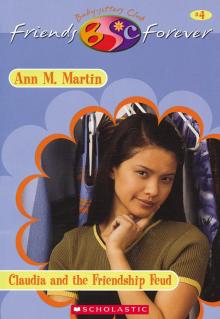 Claudia and the Friendship Feud
Claudia and the Friendship Feud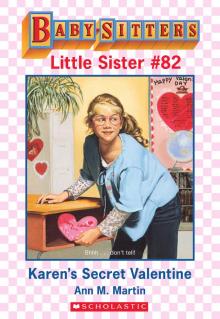 Karen's Secret Valentine
Karen's Secret Valentine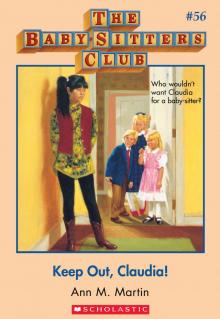 Keep Out, Claudia!
Keep Out, Claudia! Aloha, Baby-Sitters!
Aloha, Baby-Sitters!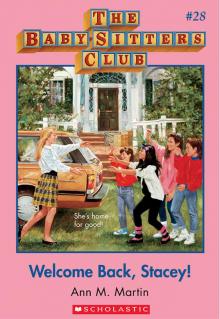 Welcome Back, Stacey
Welcome Back, Stacey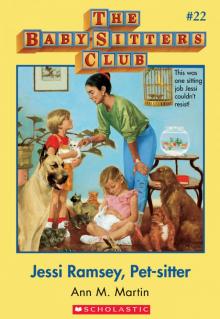 Jessi Ramsey, Pet-Sitter
Jessi Ramsey, Pet-Sitter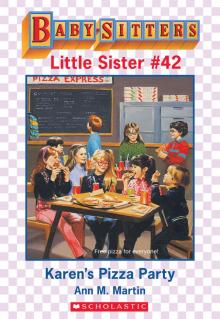 Karen's Pizza Party
Karen's Pizza Party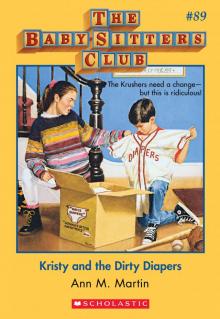 Kristy and the Dirty Diapers
Kristy and the Dirty Diapers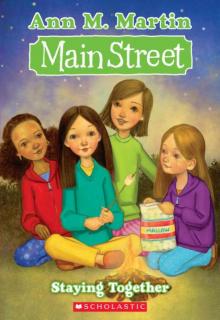 Staying Together
Staying Together Dawn and the Surfer Ghost
Dawn and the Surfer Ghost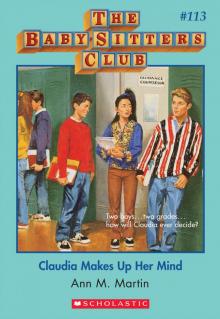 Claudia Makes Up Her Mind
Claudia Makes Up Her Mind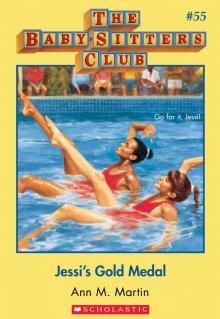 Jessi's Gold Medal
Jessi's Gold Medal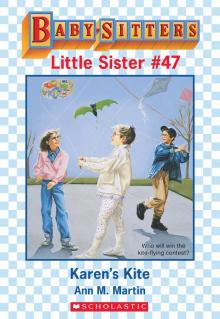 Karen's Kite
Karen's Kite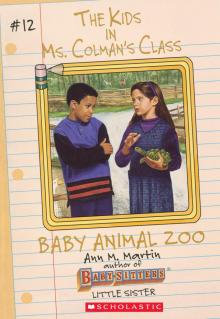 Baby Animal Zoo
Baby Animal Zoo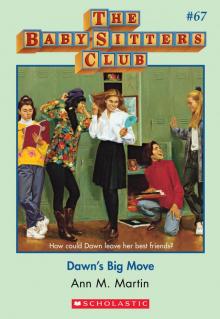 Dawn's Big Move
Dawn's Big Move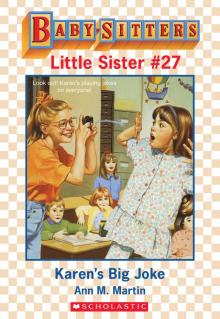 Karen's Big Joke
Karen's Big Joke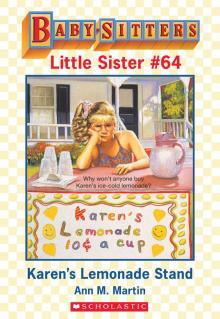 Karen's Lemonade Stand
Karen's Lemonade Stand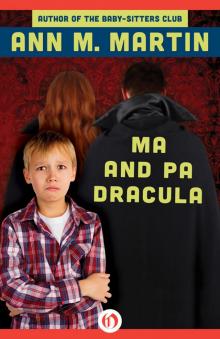 Ma and Pa Dracula
Ma and Pa Dracula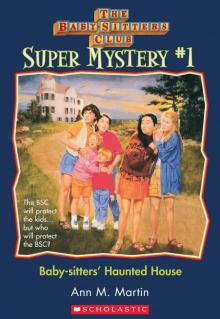 Baby-Sitters' Haunted House
Baby-Sitters' Haunted House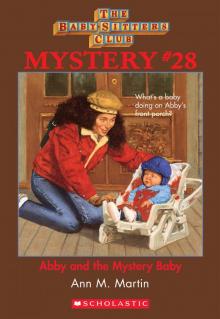 Abby and the Mystery Baby
Abby and the Mystery Baby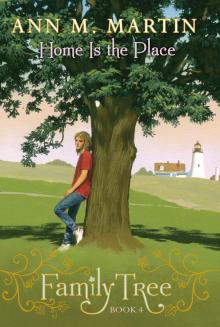 Home Is the Place
Home Is the Place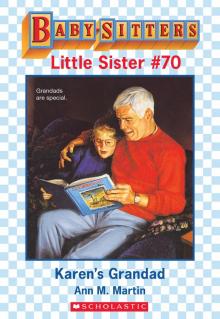 Karen's Grandad
Karen's Grandad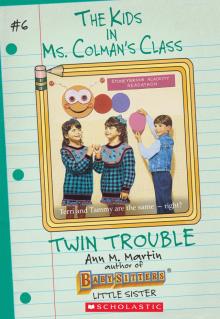 Twin Trouble
Twin Trouble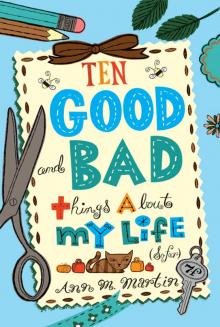 Ten Good and Bad Things About My Life (So Far)
Ten Good and Bad Things About My Life (So Far)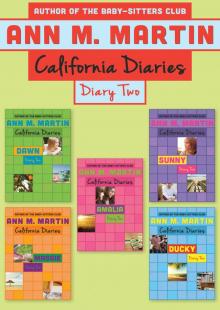 Diary Two
Diary Two Baby-Sitters Club 027
Baby-Sitters Club 027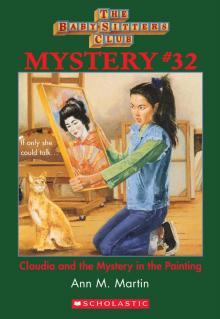 Claudia and the Mystery Painting
Claudia and the Mystery Painting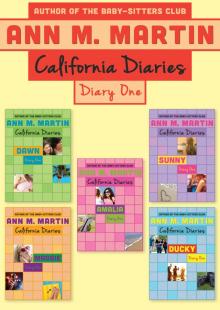 Diary One
Diary One Baby-Sitters Club 037
Baby-Sitters Club 037 Baby-Sitters Club 028
Baby-Sitters Club 028 Baby-Sitters Club 085
Baby-Sitters Club 085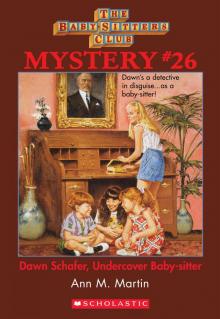 Dawn Schaffer Undercover Baby-Sitter
Dawn Schaffer Undercover Baby-Sitter Jessi's Babysitter
Jessi's Babysitter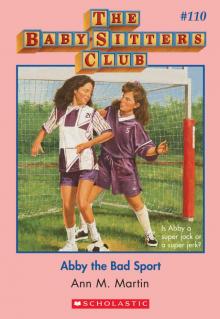 The Baby-Sitters Club #110: Abby the Bad Sport (Baby-Sitters Club, The)
The Baby-Sitters Club #110: Abby the Bad Sport (Baby-Sitters Club, The) Karen's Little Sister
Karen's Little Sister Baby-Sitters Club 058
Baby-Sitters Club 058 Claudia And The Genius On Elm St.
Claudia And The Genius On Elm St.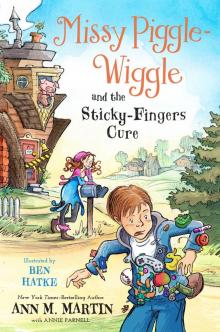 Missy Piggle-Wiggle and the Sticky-Fingers Cure
Missy Piggle-Wiggle and the Sticky-Fingers Cure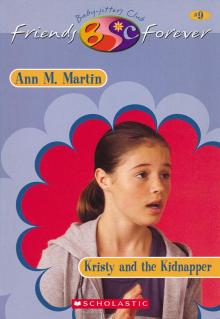 Kristy and Kidnapper
Kristy and Kidnapper Baby-Sitters Club 041
Baby-Sitters Club 041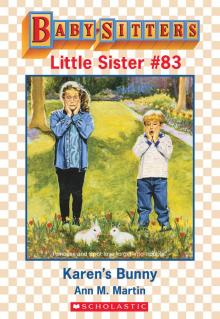 Karen's Bunny Trouble
Karen's Bunny Trouble Baby-Sitters Club 032
Baby-Sitters Club 032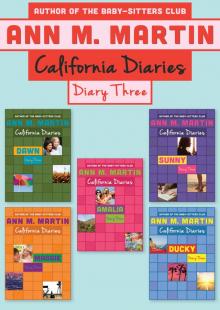 Diary Three
Diary Three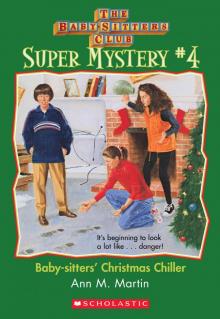 Christmas Chiller
Christmas Chiller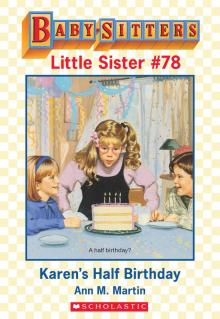 Karen's Half-Birthday
Karen's Half-Birthday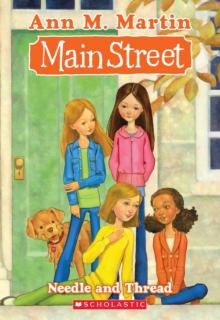 Needle and Thread
Needle and Thread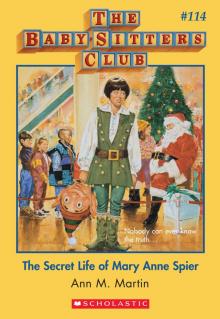 Secret Life of Mary Anne Spier
Secret Life of Mary Anne Spier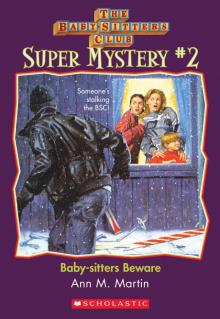 Baby-Sitters Beware
Baby-Sitters Beware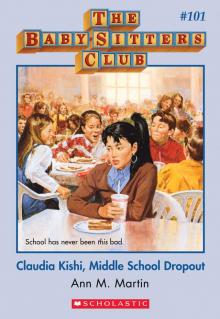 Claudia Kishi, Middle School Drop-Out
Claudia Kishi, Middle School Drop-Out Logan Likes Mary Anne !
Logan Likes Mary Anne ! Baby-Sitters Club 061
Baby-Sitters Club 061 Best Friends
Best Friends Baby-Sitters Club 031
Baby-Sitters Club 031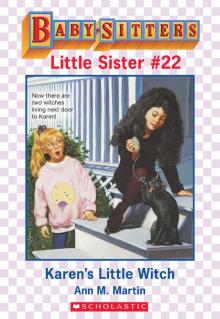 Karen's Little Witch
Karen's Little Witch Jessi Ramsey, Petsitter
Jessi Ramsey, Petsitter Baby-Sitters Club 123
Baby-Sitters Club 123 Baby-Sitters Club 059
Baby-Sitters Club 059 Baby-Sitters Club 033
Baby-Sitters Club 033 Baby-Sitters Club 060
Baby-Sitters Club 060 Baby-Sitters Club 094
Baby-Sitters Club 094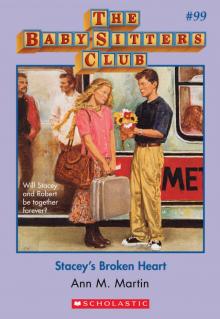 The Baby-Sitters Club #99: Stacey's Broken Heart
The Baby-Sitters Club #99: Stacey's Broken Heart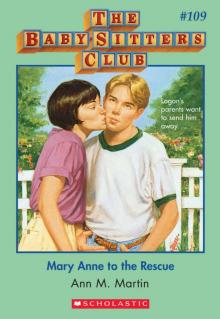 The Baby-Sitters Club #109: Mary Anne to the Rescue (Baby-Sitters Club, The)
The Baby-Sitters Club #109: Mary Anne to the Rescue (Baby-Sitters Club, The) Mystery At Claudia's House
Mystery At Claudia's House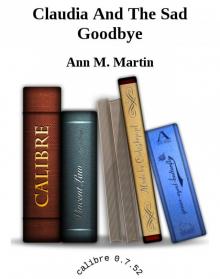 Claudia And The Sad Goodbye
Claudia And The Sad Goodbye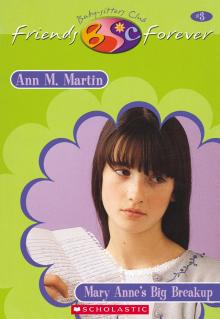 Mary Anne's Big Break-Up
Mary Anne's Big Break-Up Baby-Sitters Club 025
Baby-Sitters Club 025 Baby-Sitters Club 042
Baby-Sitters Club 042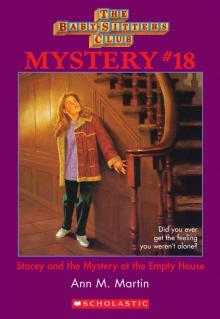 Stacey and the Mystery of the Empty House
Stacey and the Mystery of the Empty House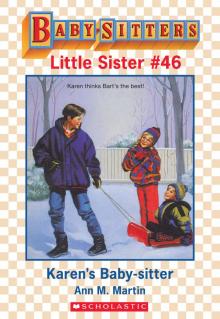 Karen's Baby-Sitter
Karen's Baby-Sitter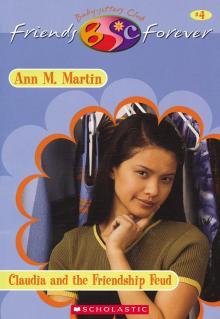 Claudia's Friendship Feud
Claudia's Friendship Feud Baby-Sitters Club 090
Baby-Sitters Club 090 Baby-Sitters Club 021
Baby-Sitters Club 021 Baby-Sitters Club 056
Baby-Sitters Club 056 Baby-Sitters Club 040
Baby-Sitters Club 040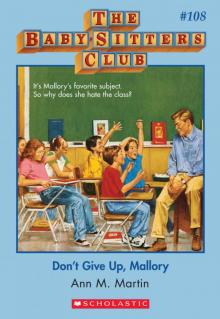 The Baby-Sitters Club #108: Don't Give Up, Mallory (Baby-Sitters Club, The)
The Baby-Sitters Club #108: Don't Give Up, Mallory (Baby-Sitters Club, The)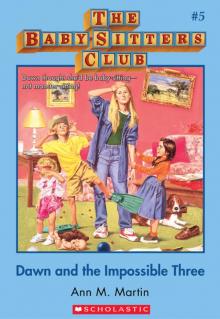 Dawn and the Impossible Three
Dawn and the Impossible Three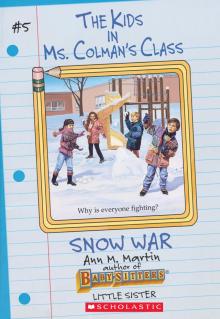 The Snow War
The Snow War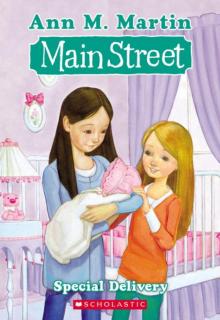 Special Delivery
Special Delivery Baby-Sitters Club 057
Baby-Sitters Club 057 Mary Anne And Too Many Babies
Mary Anne And Too Many Babies Baby-Sitters Club 030
Baby-Sitters Club 030